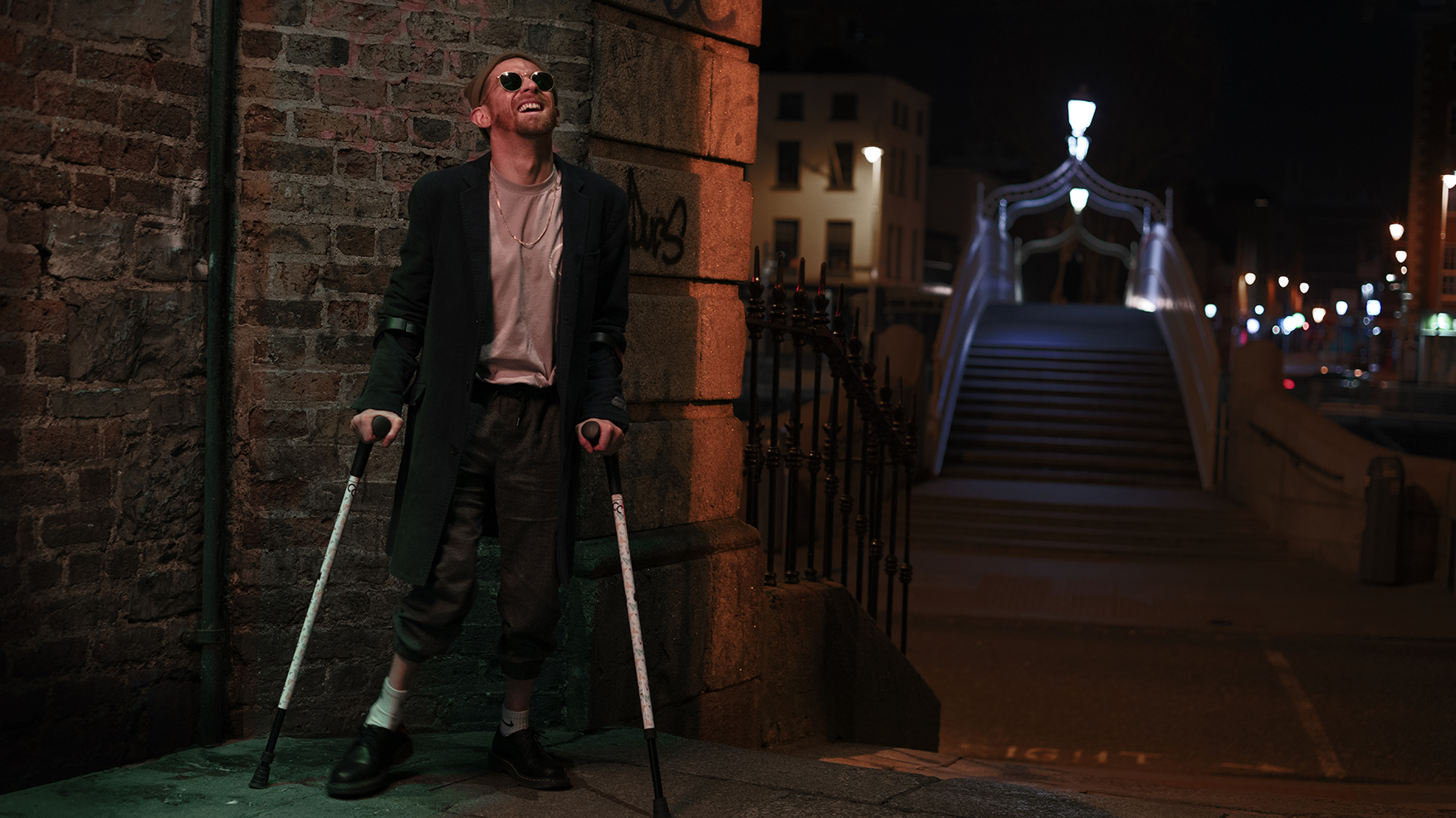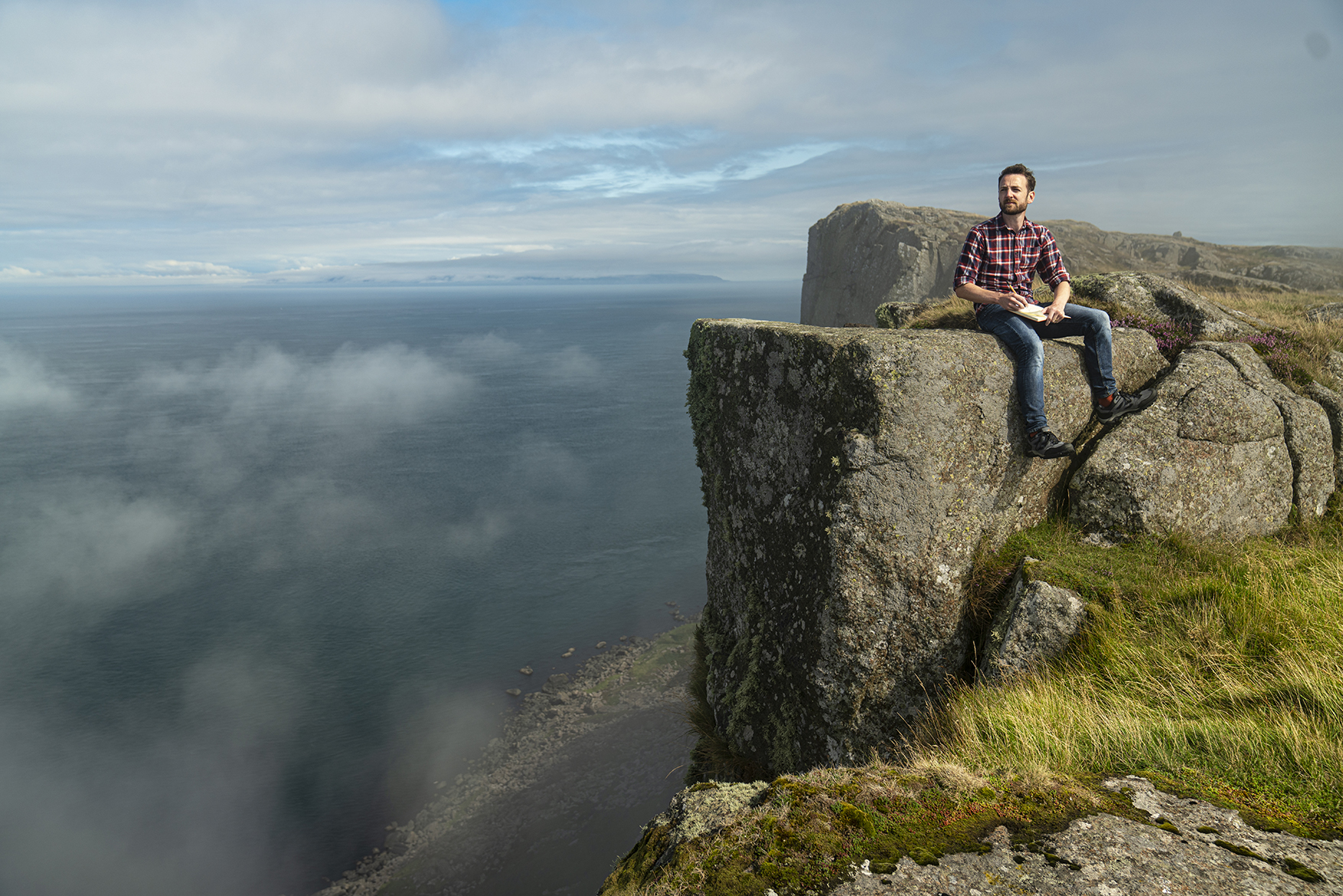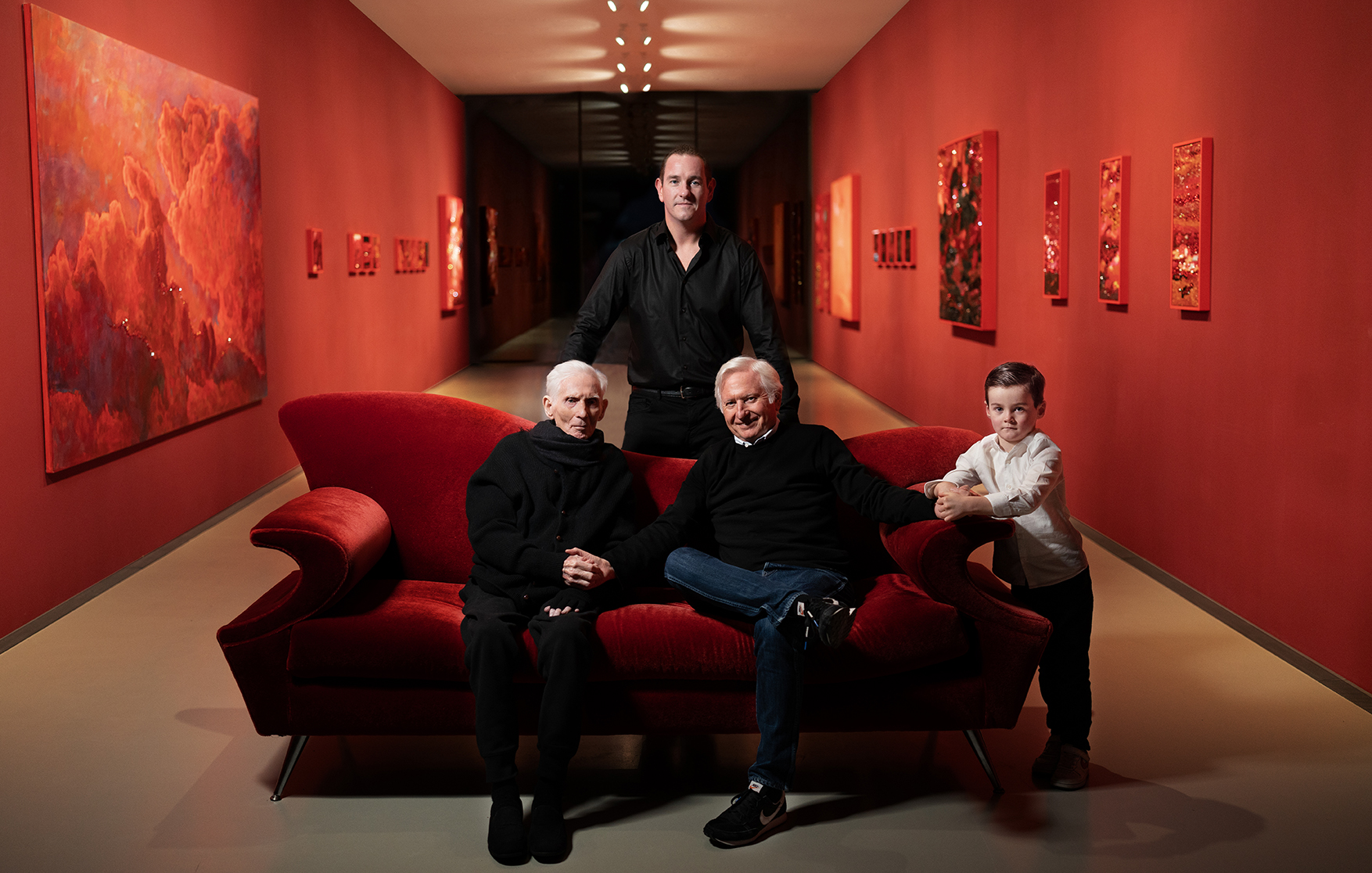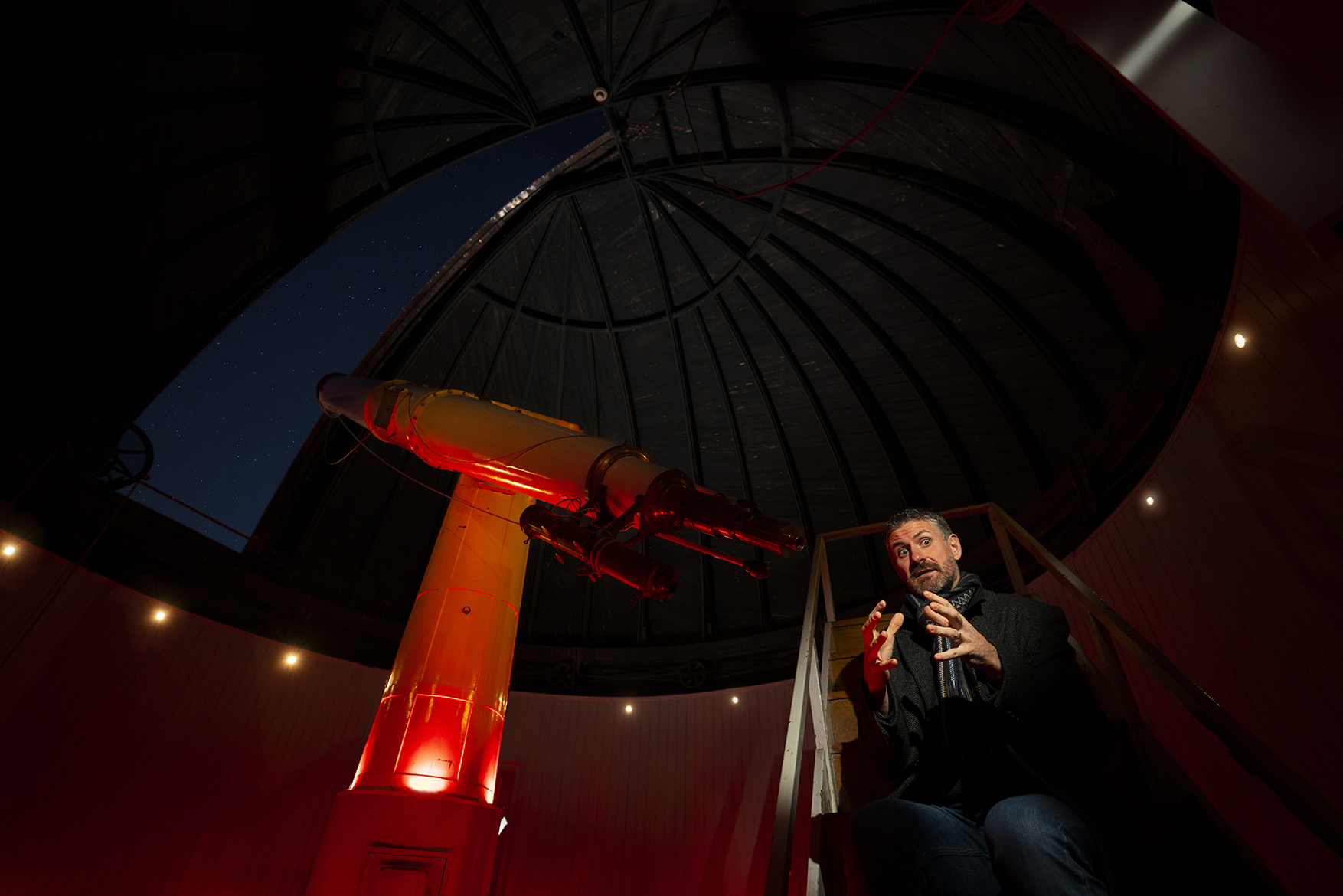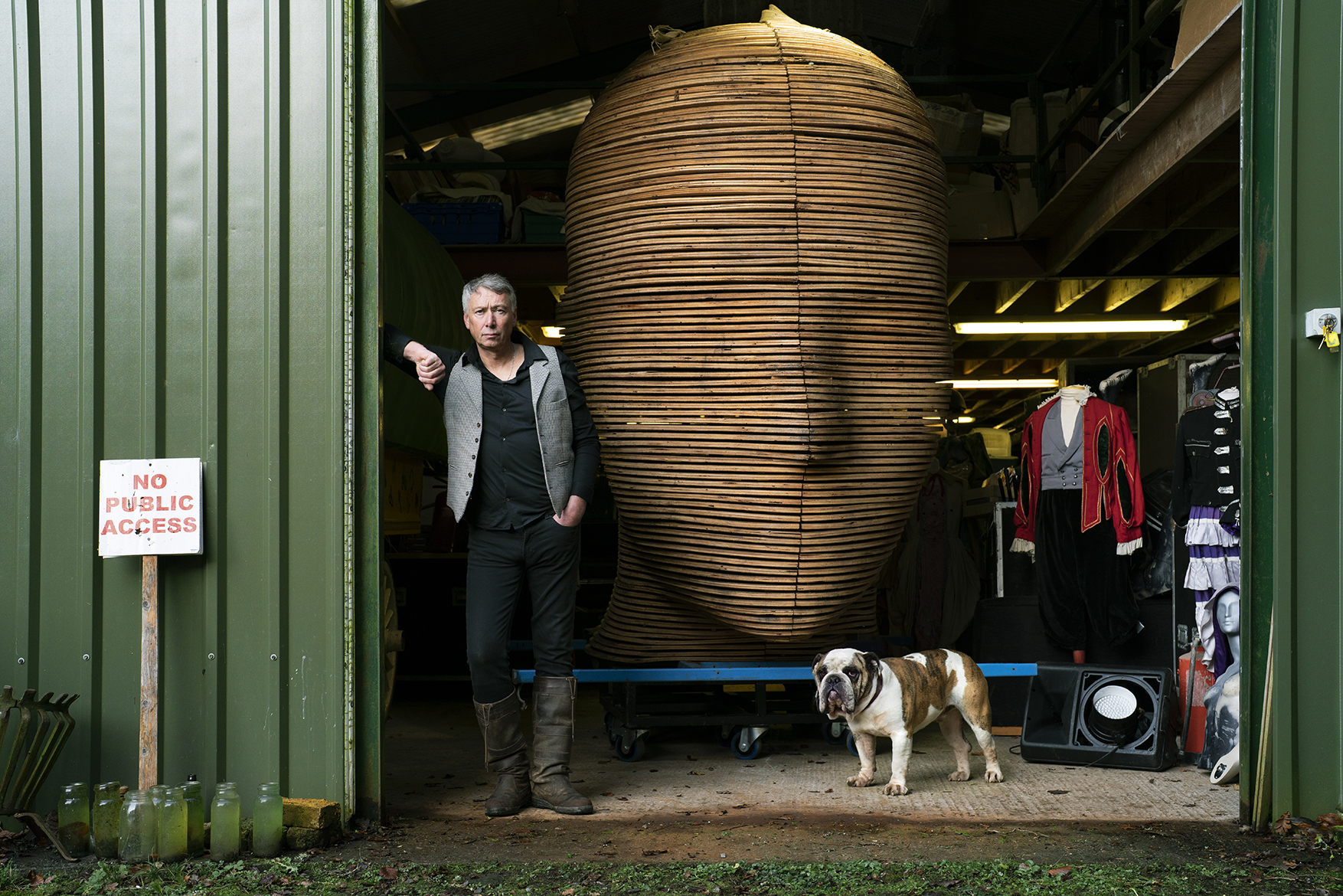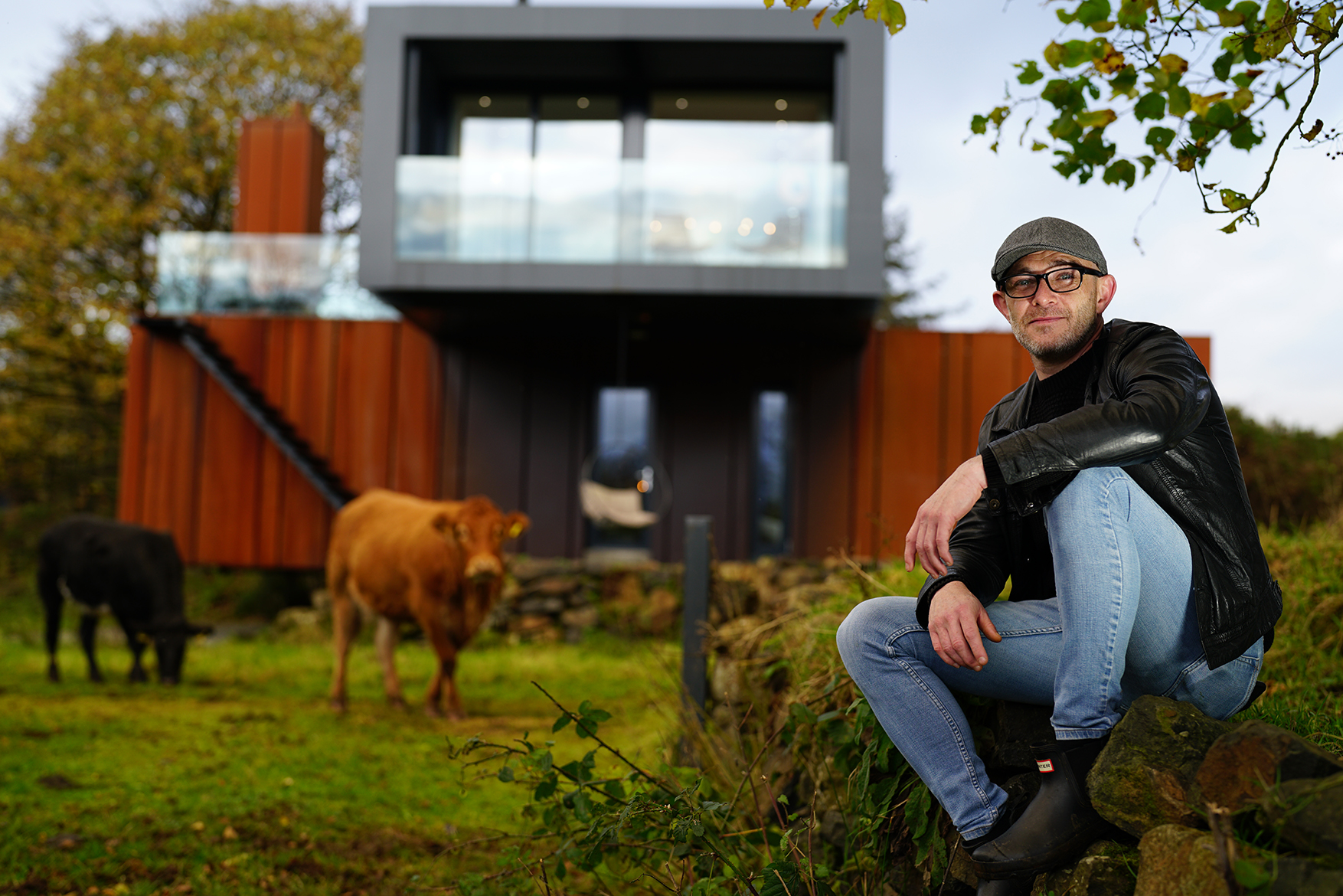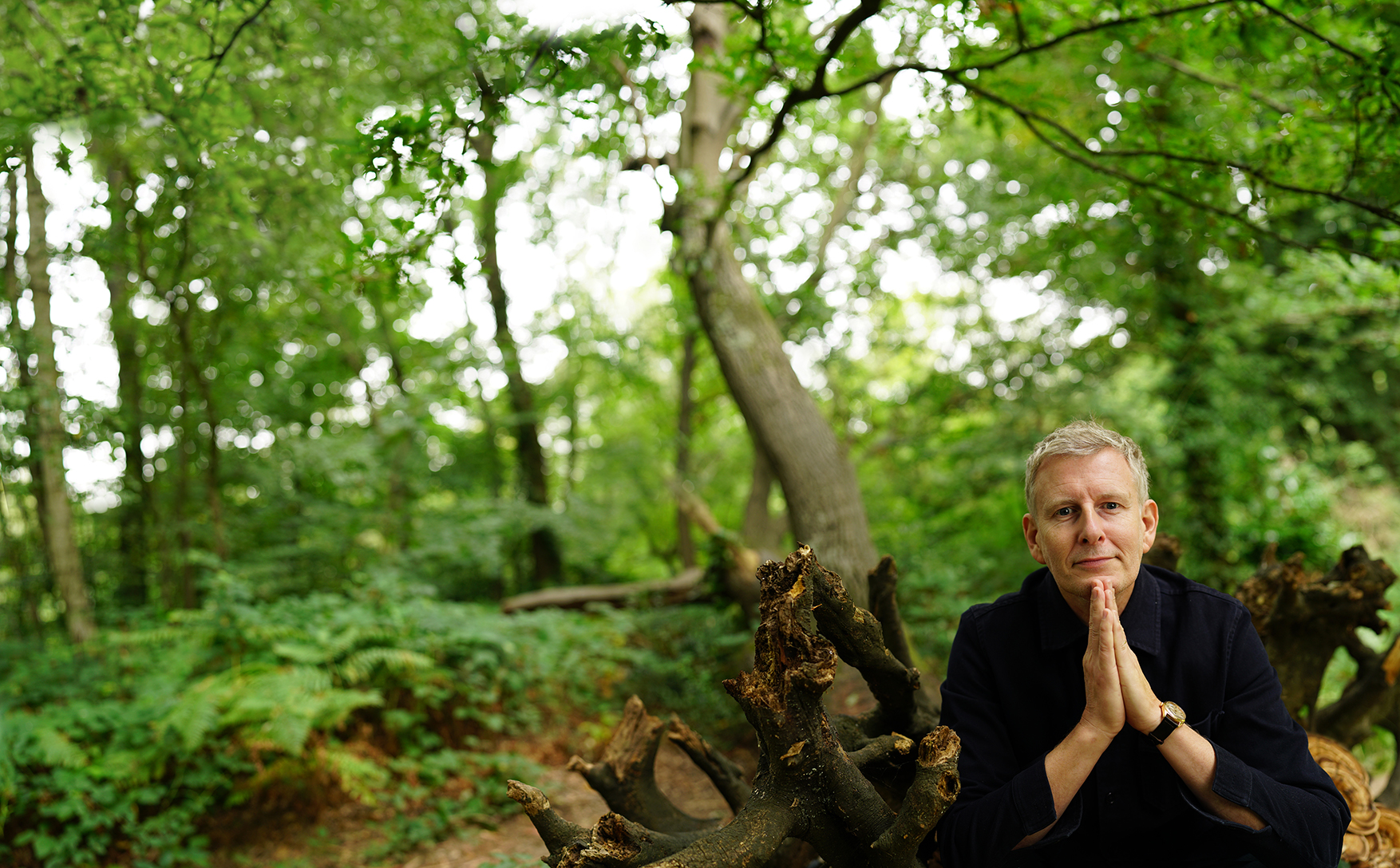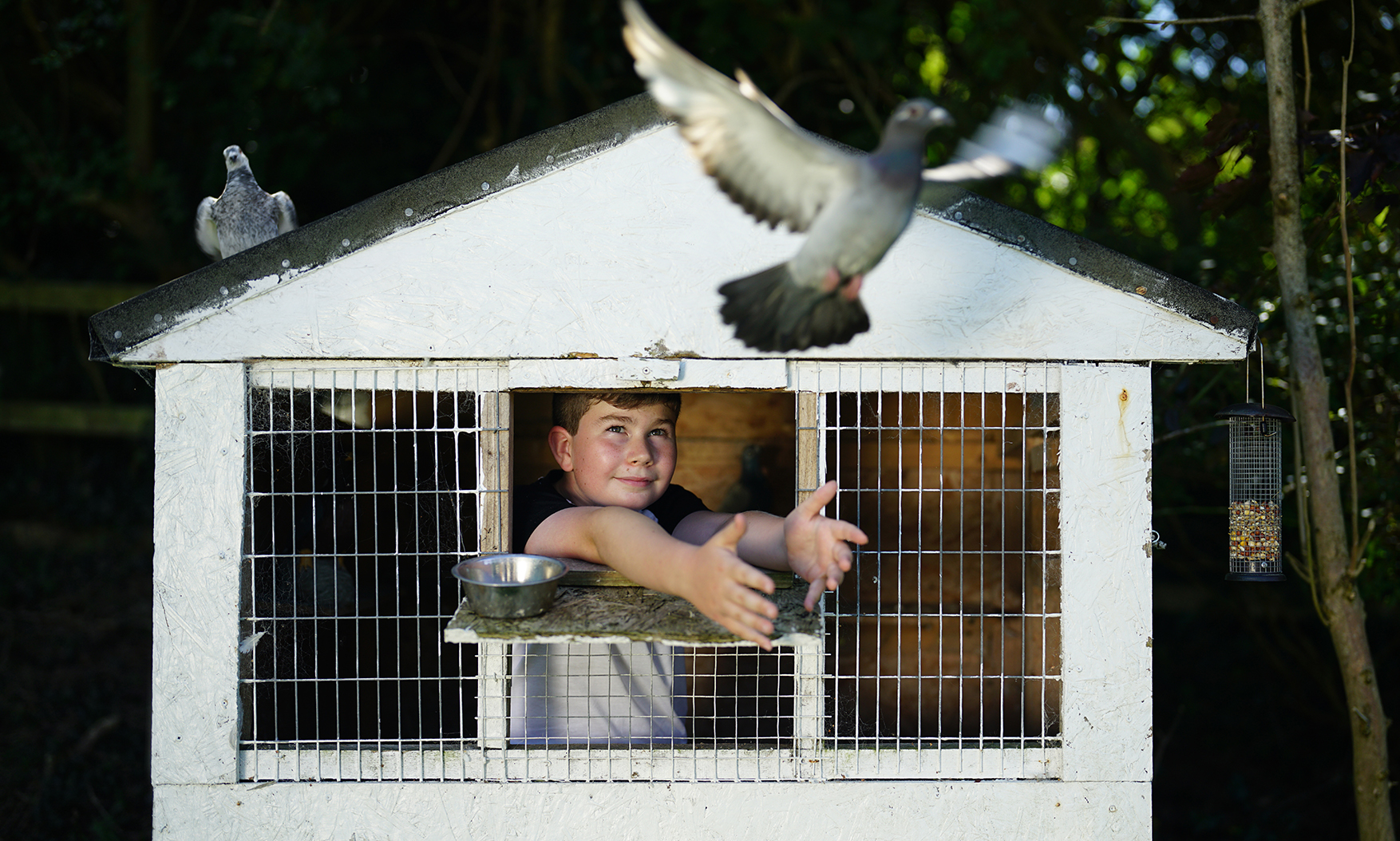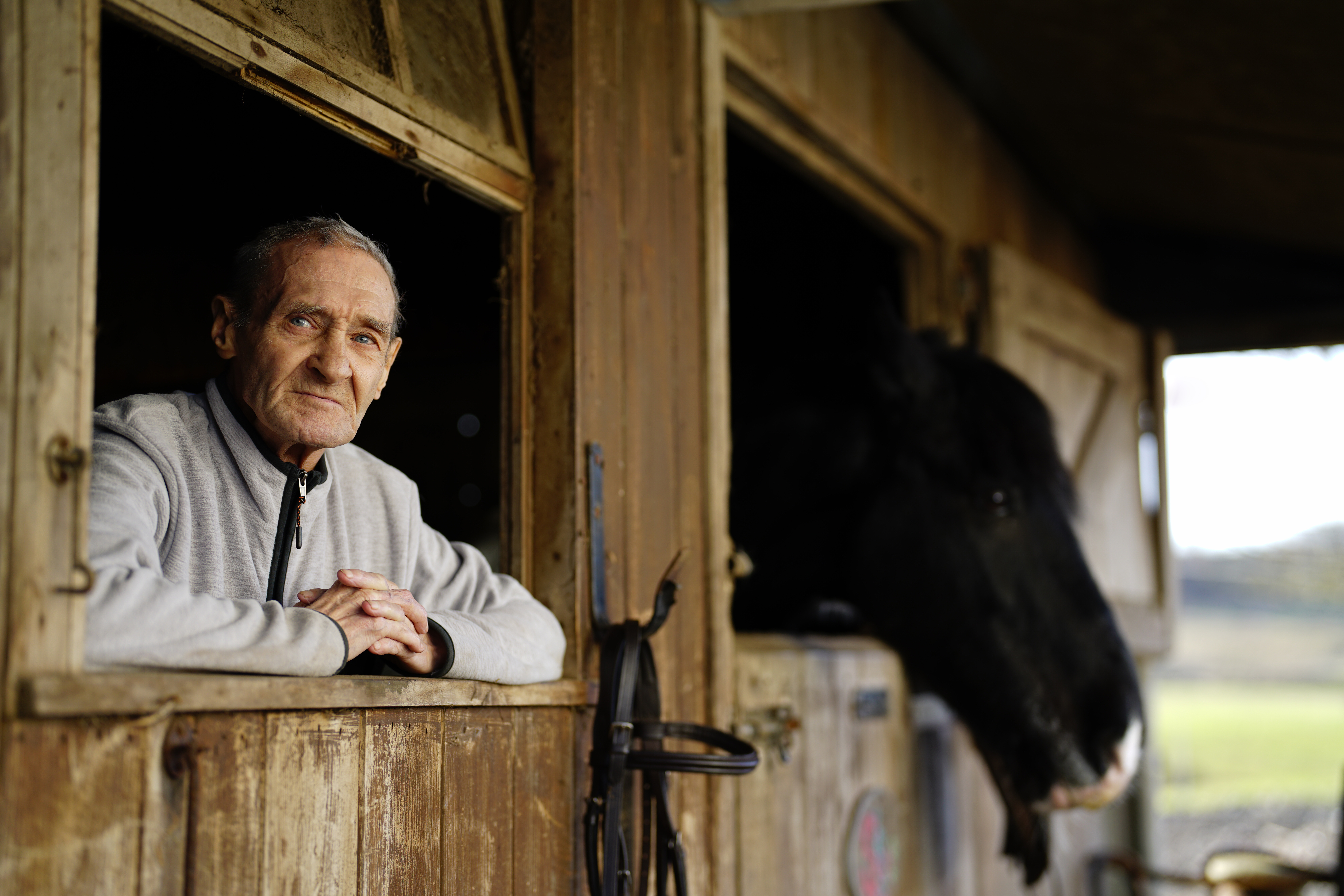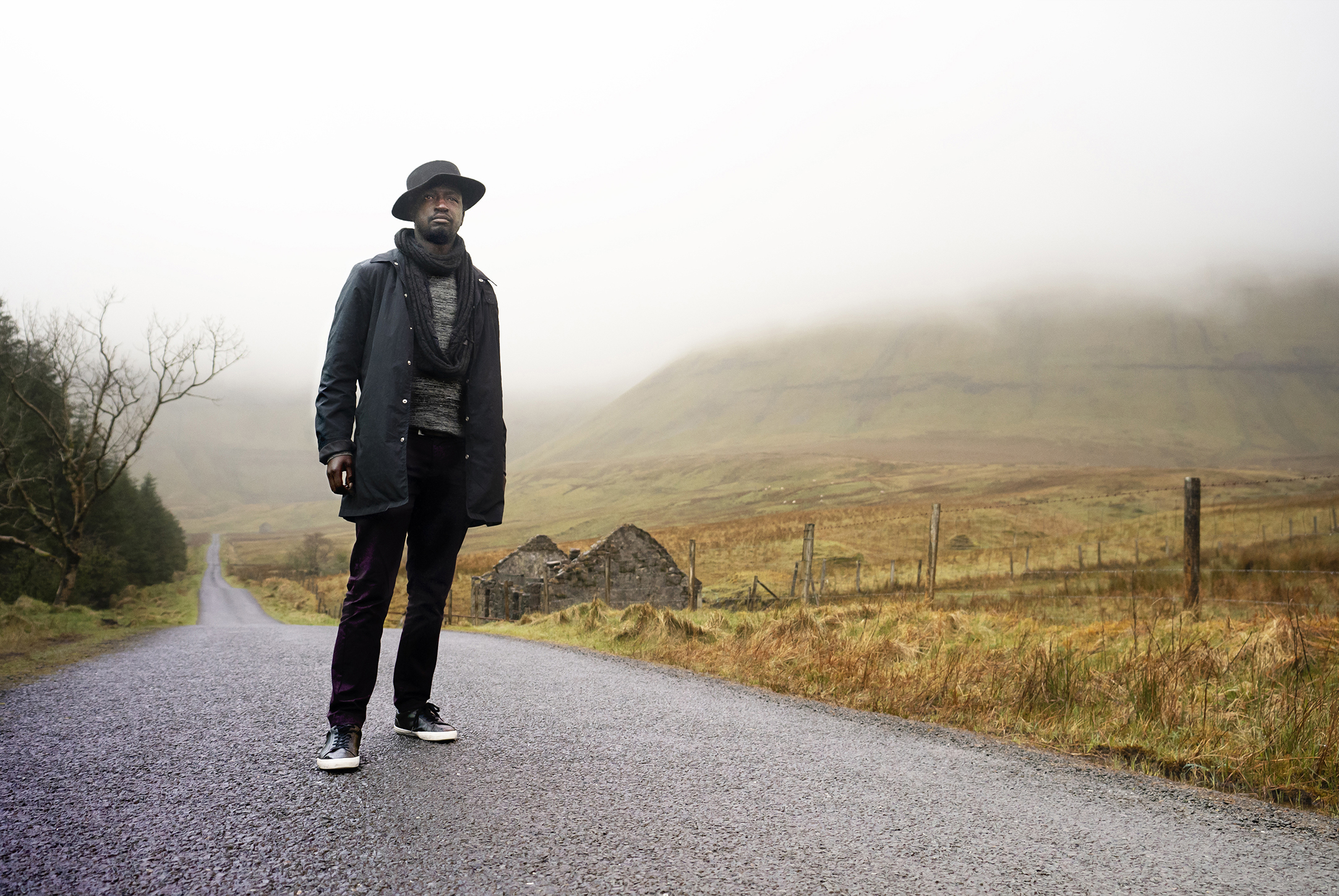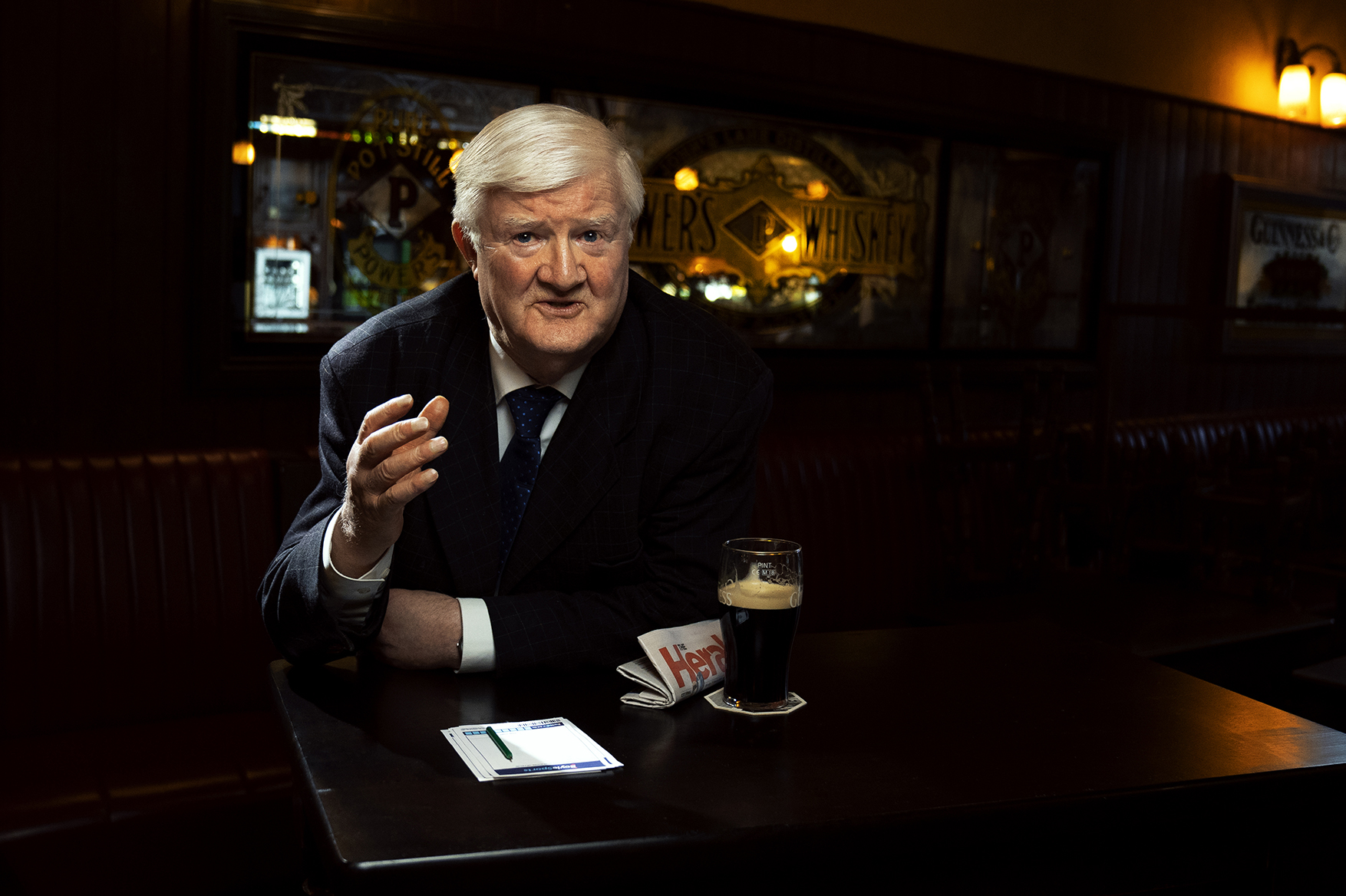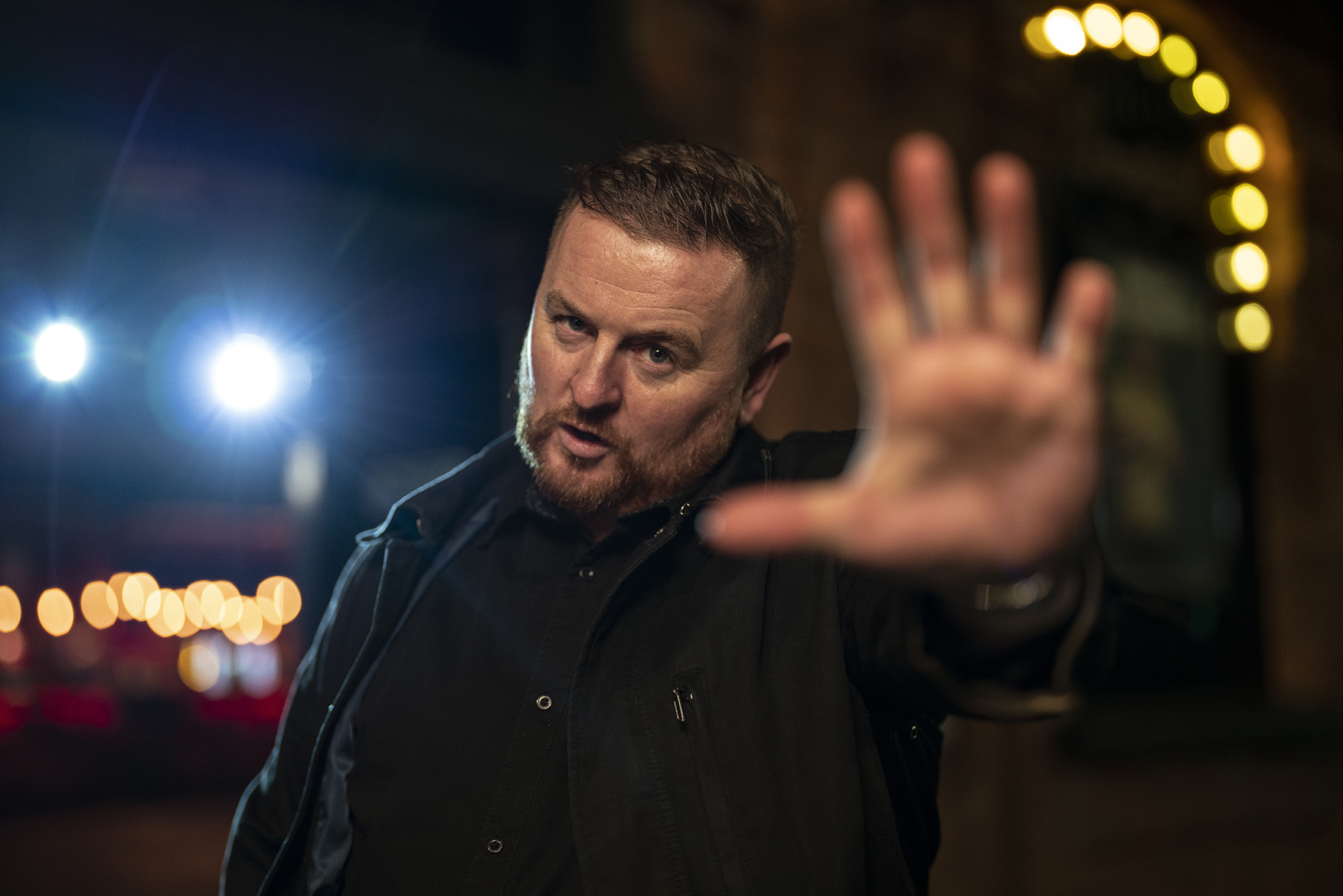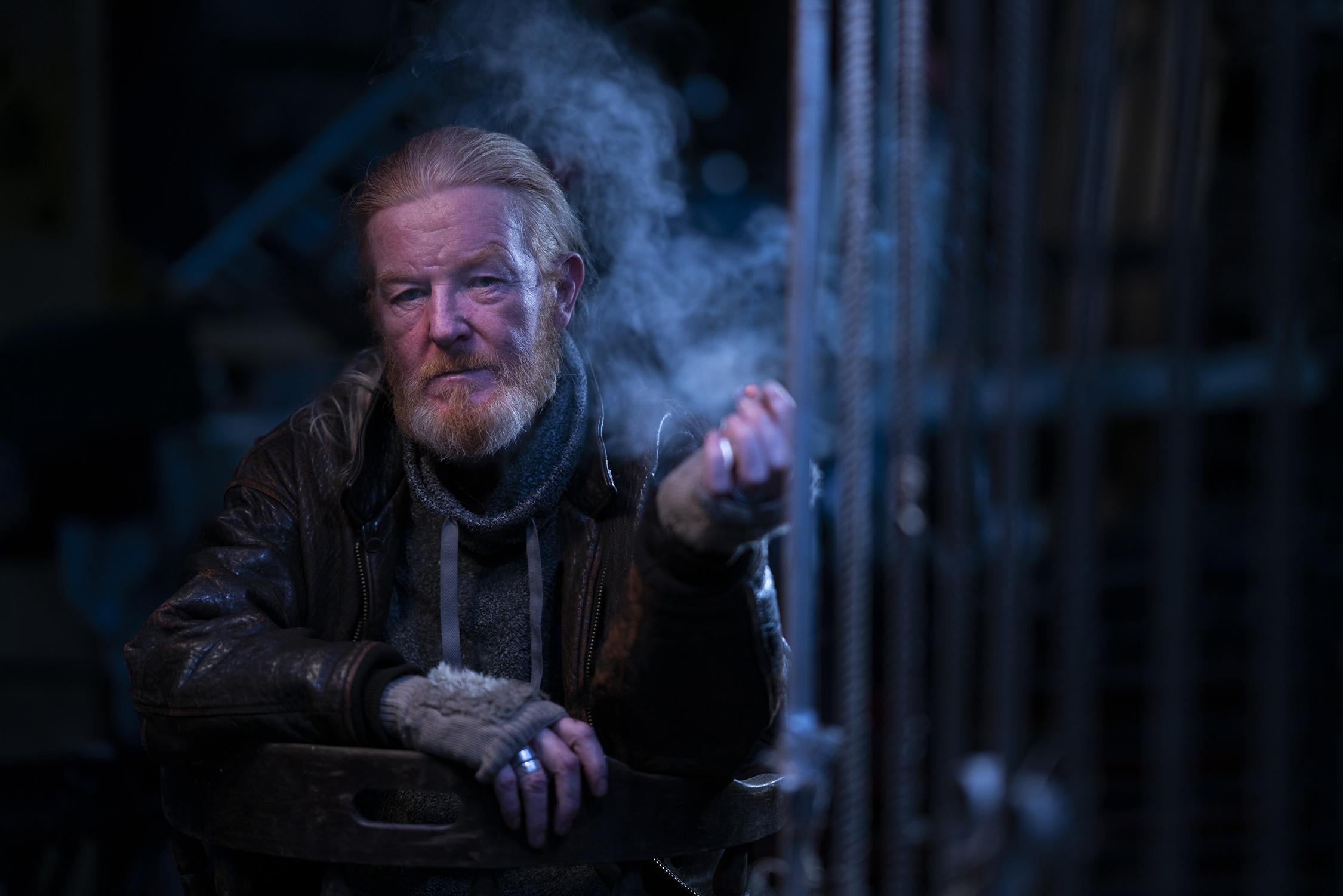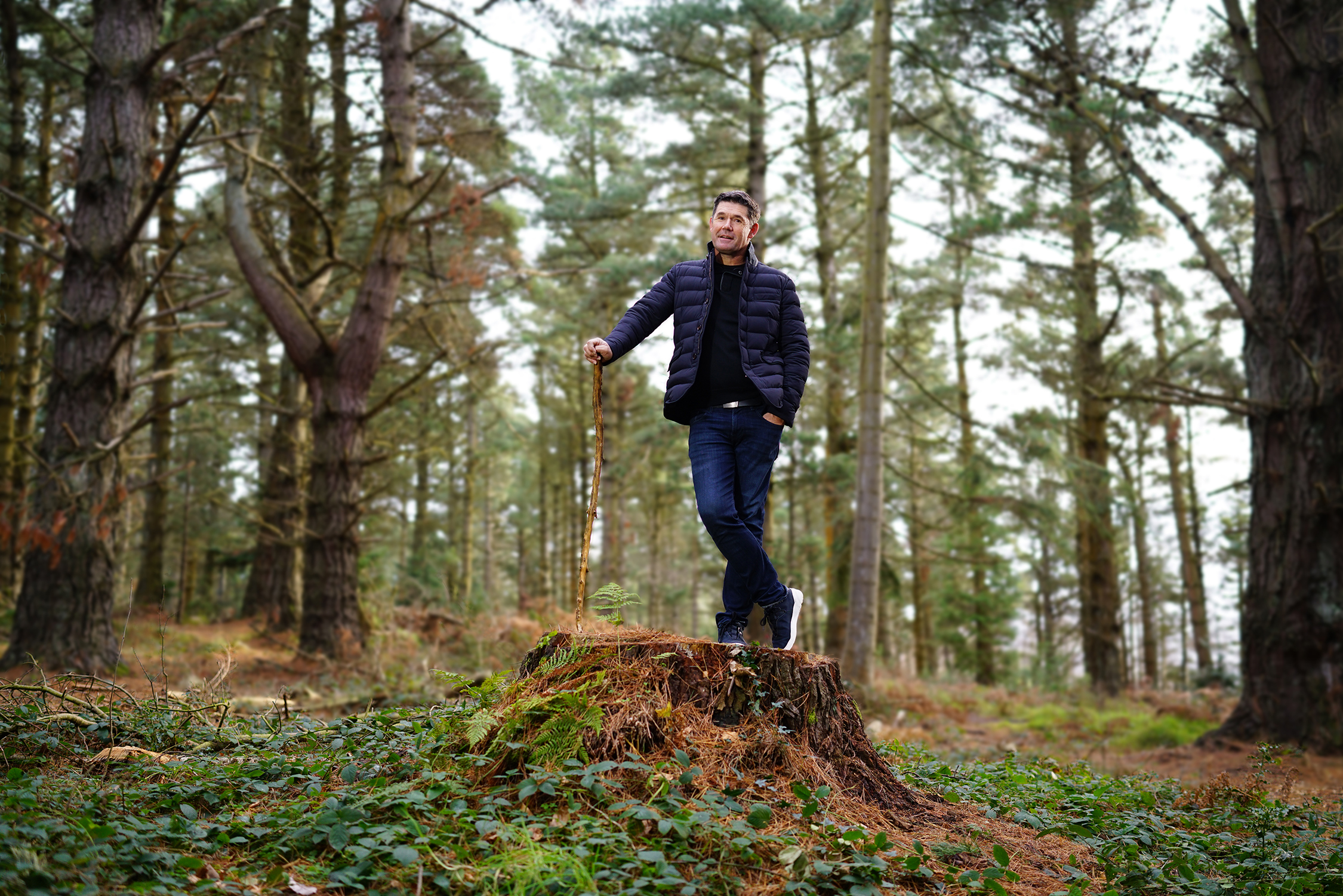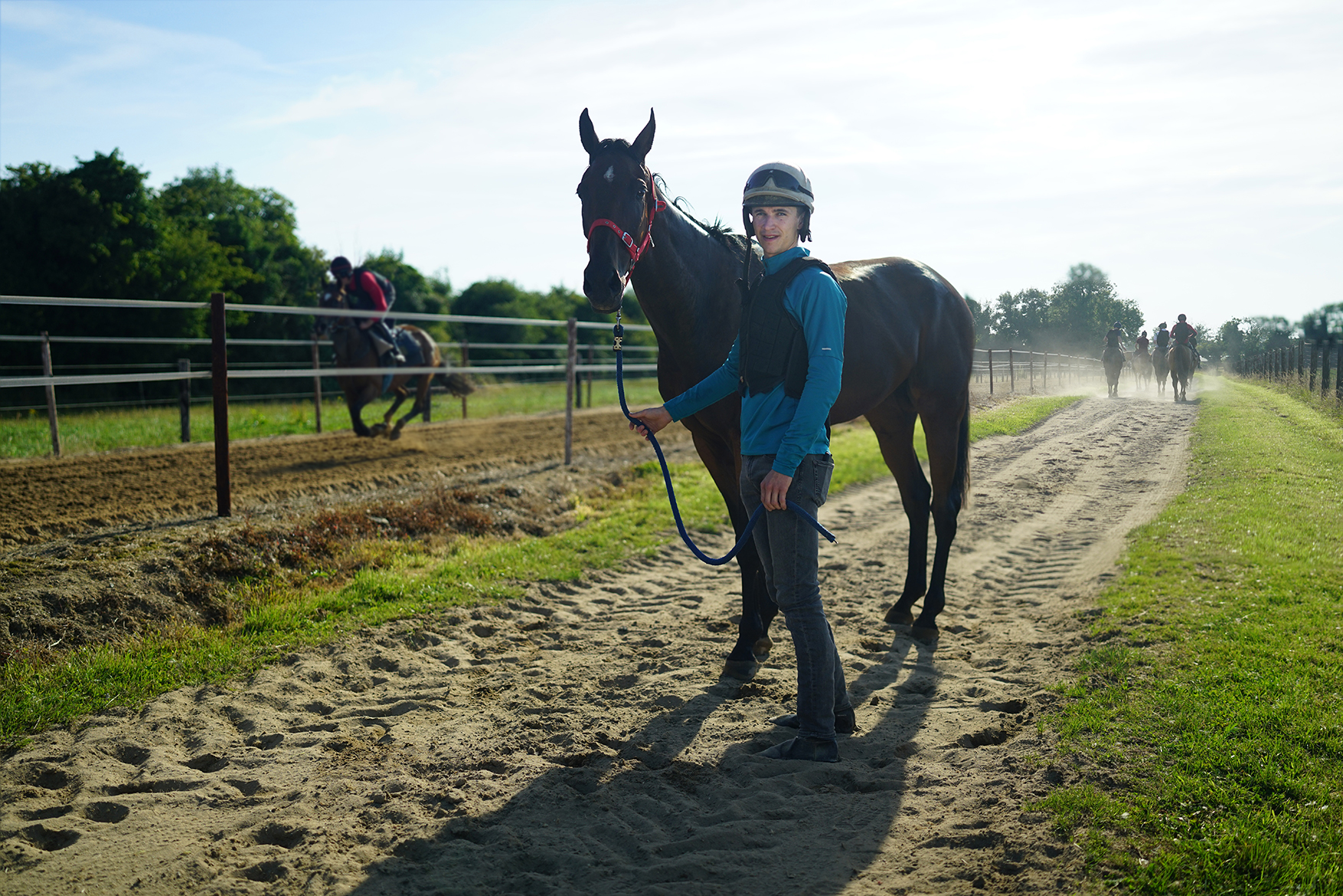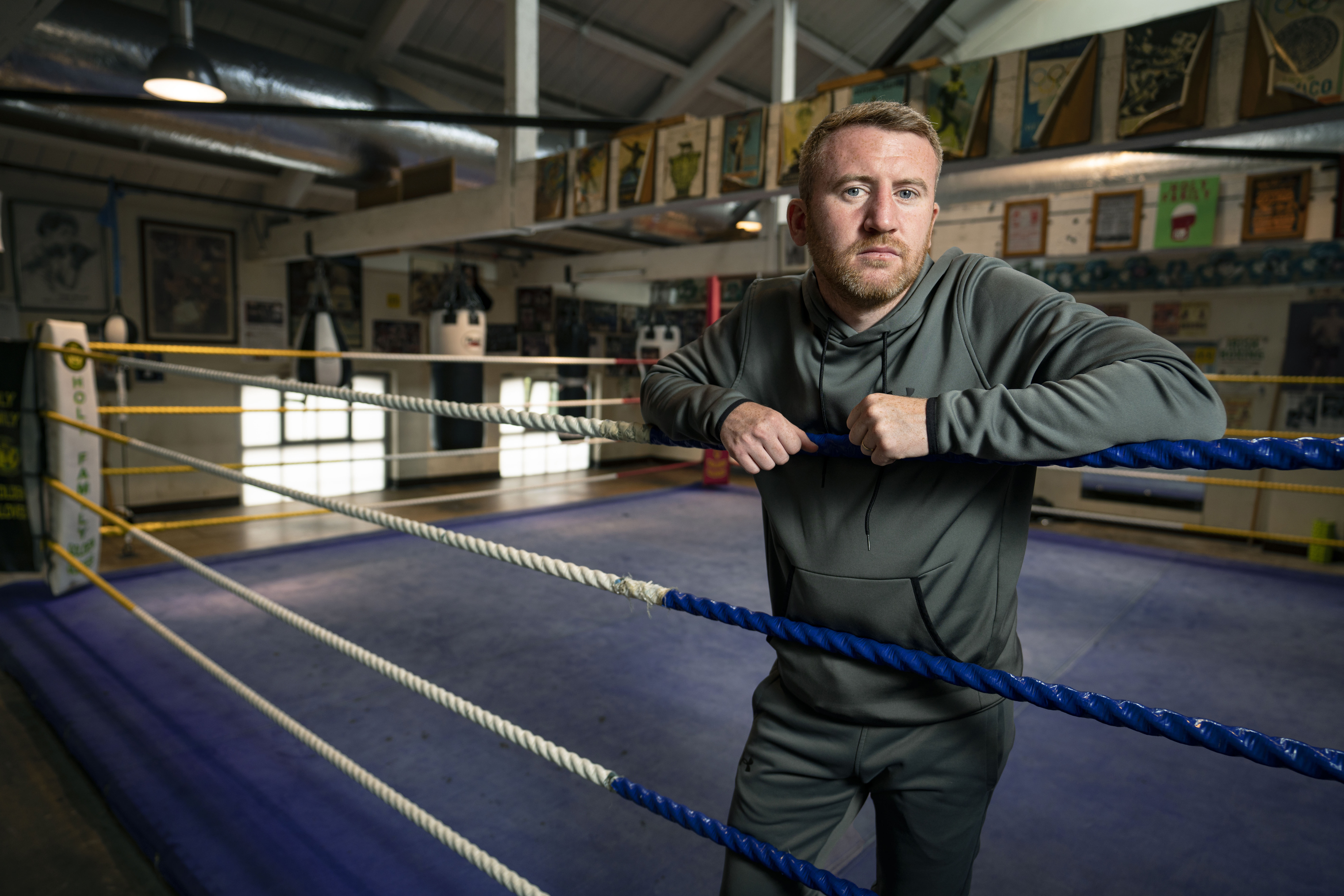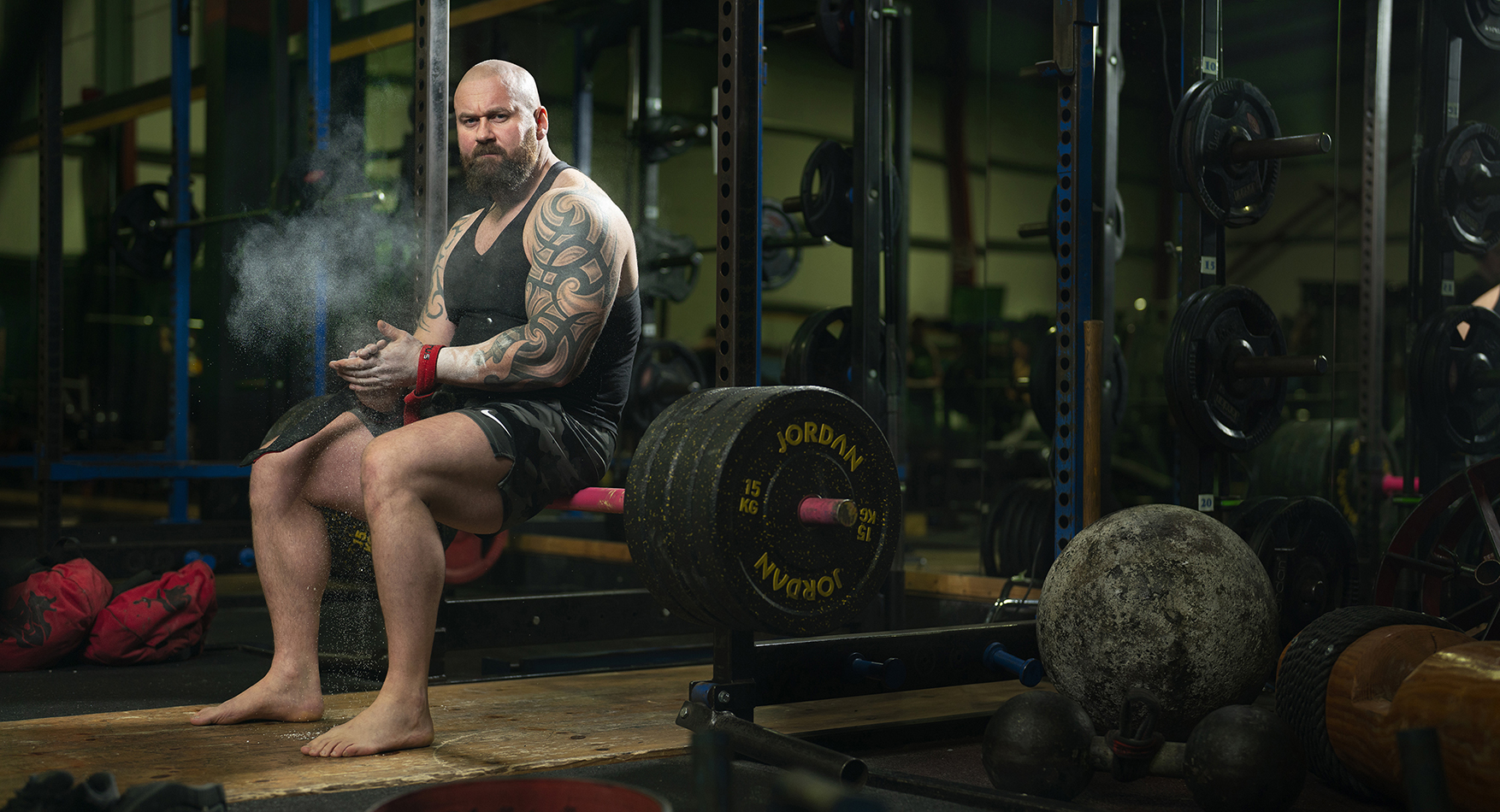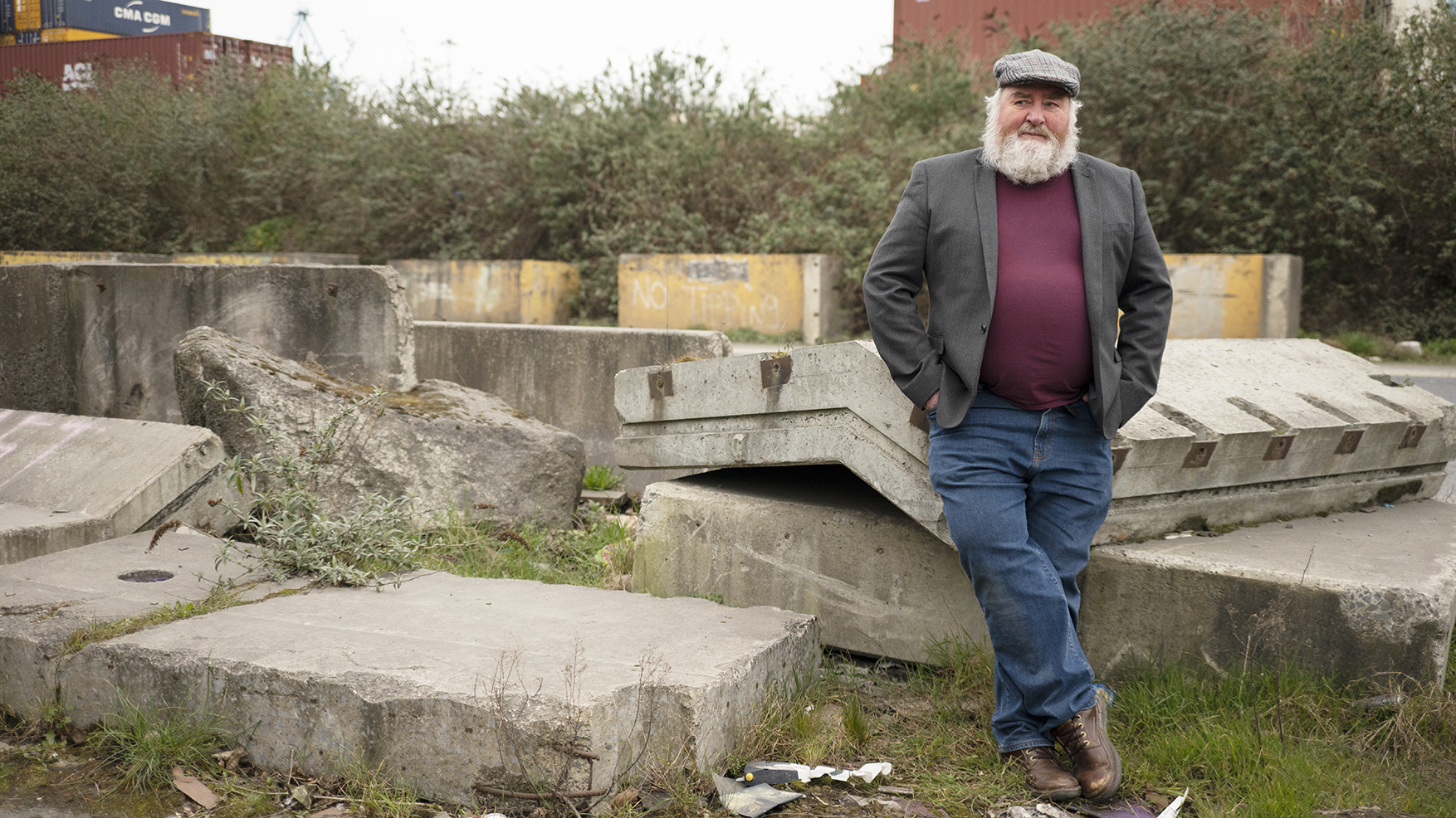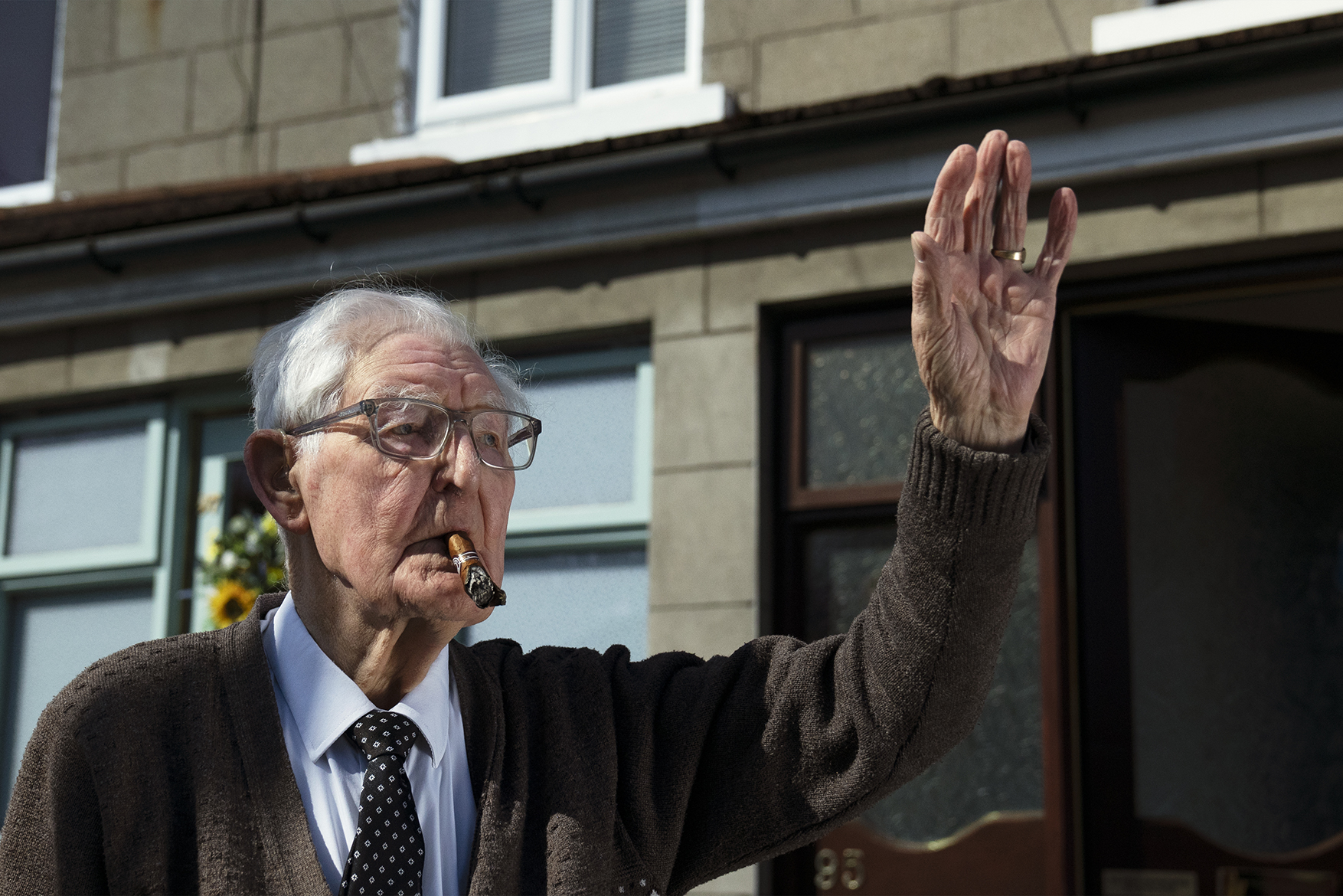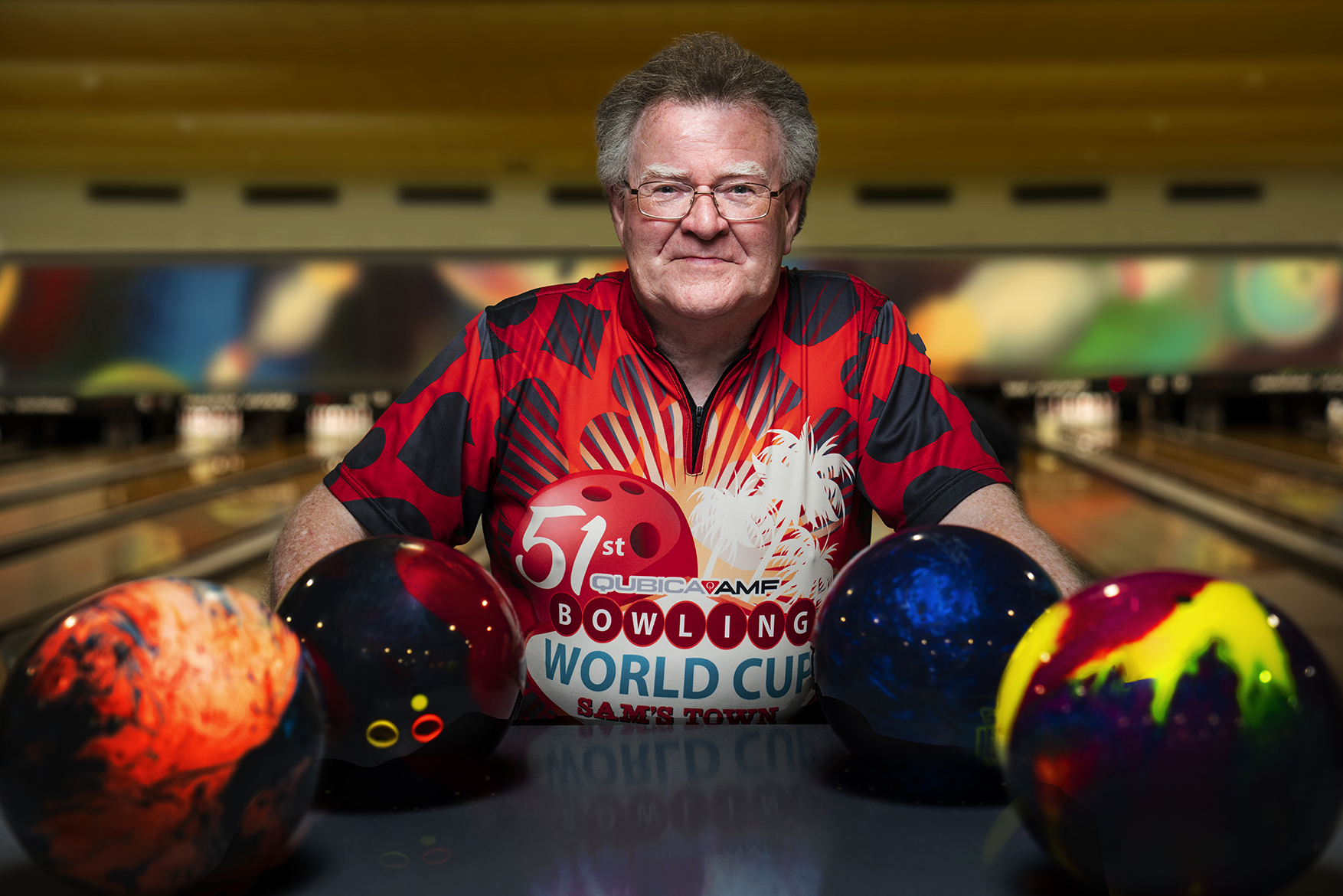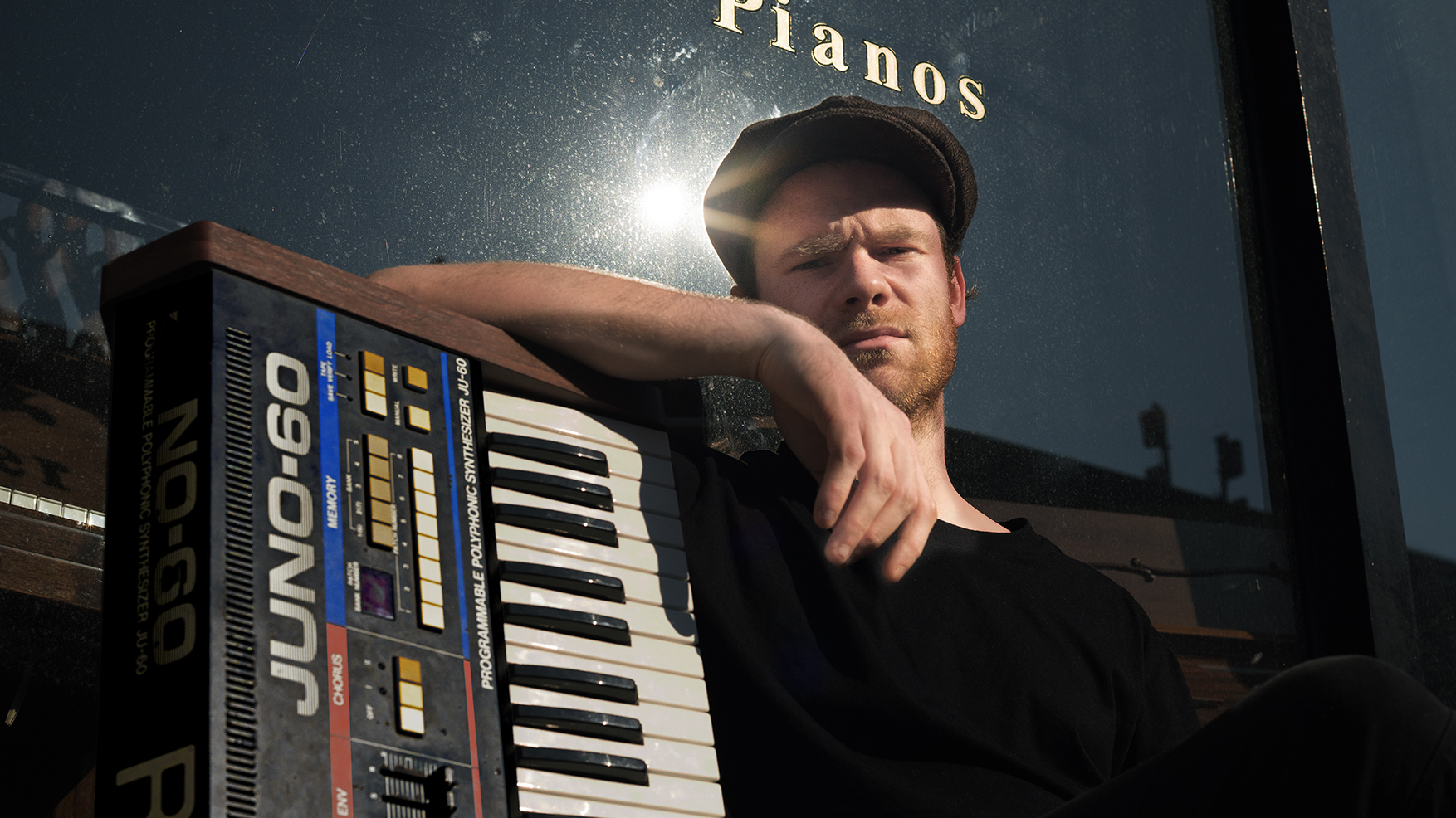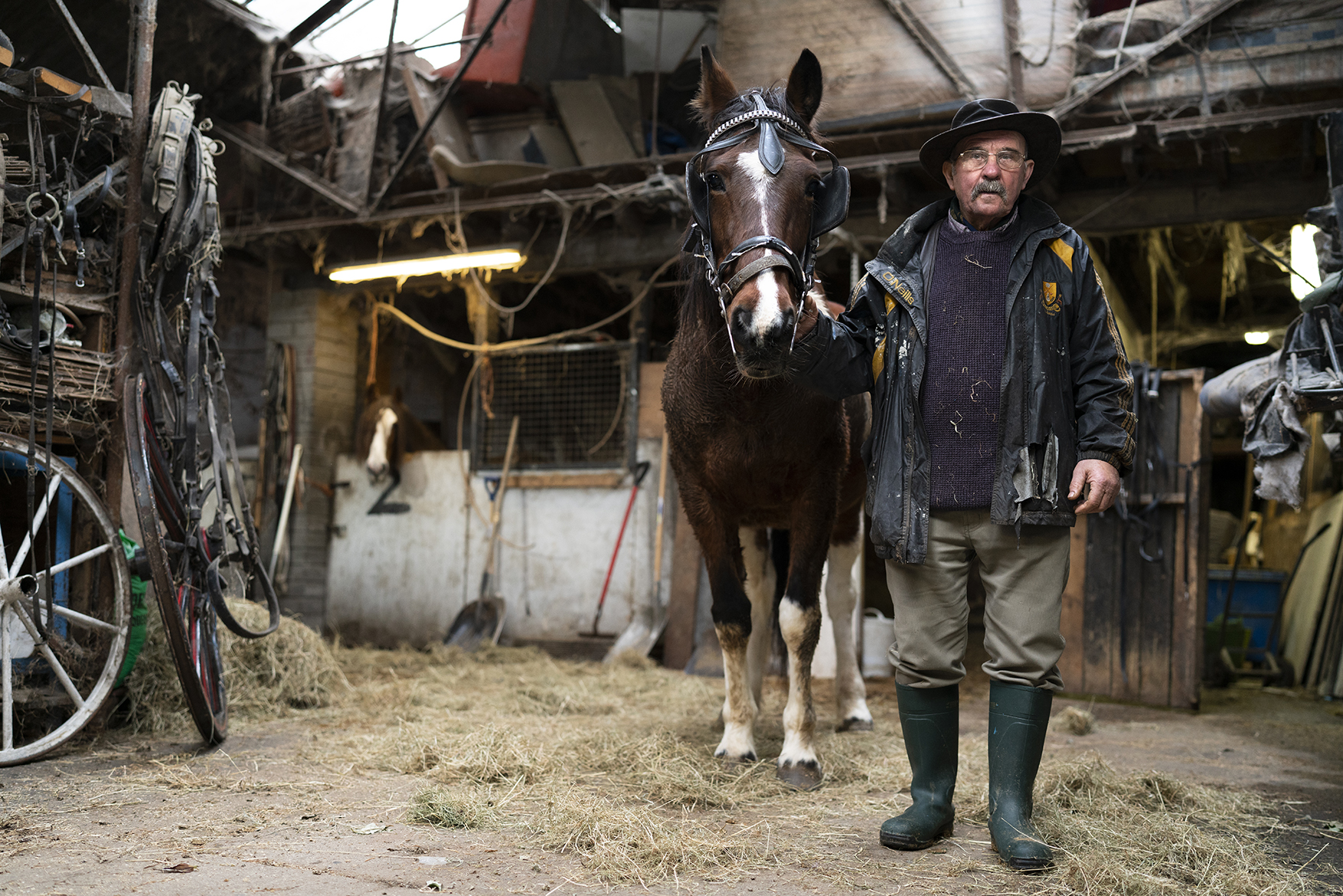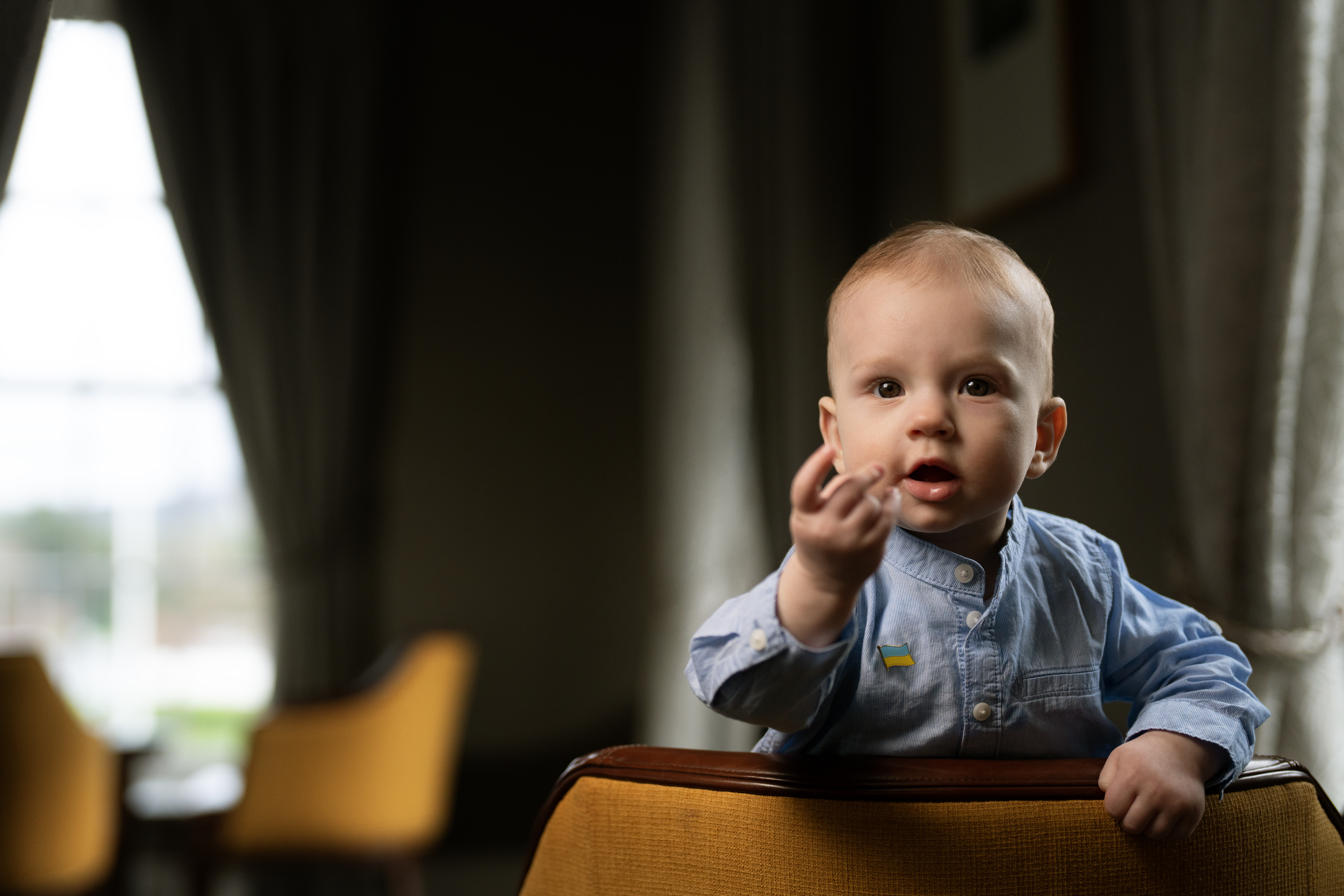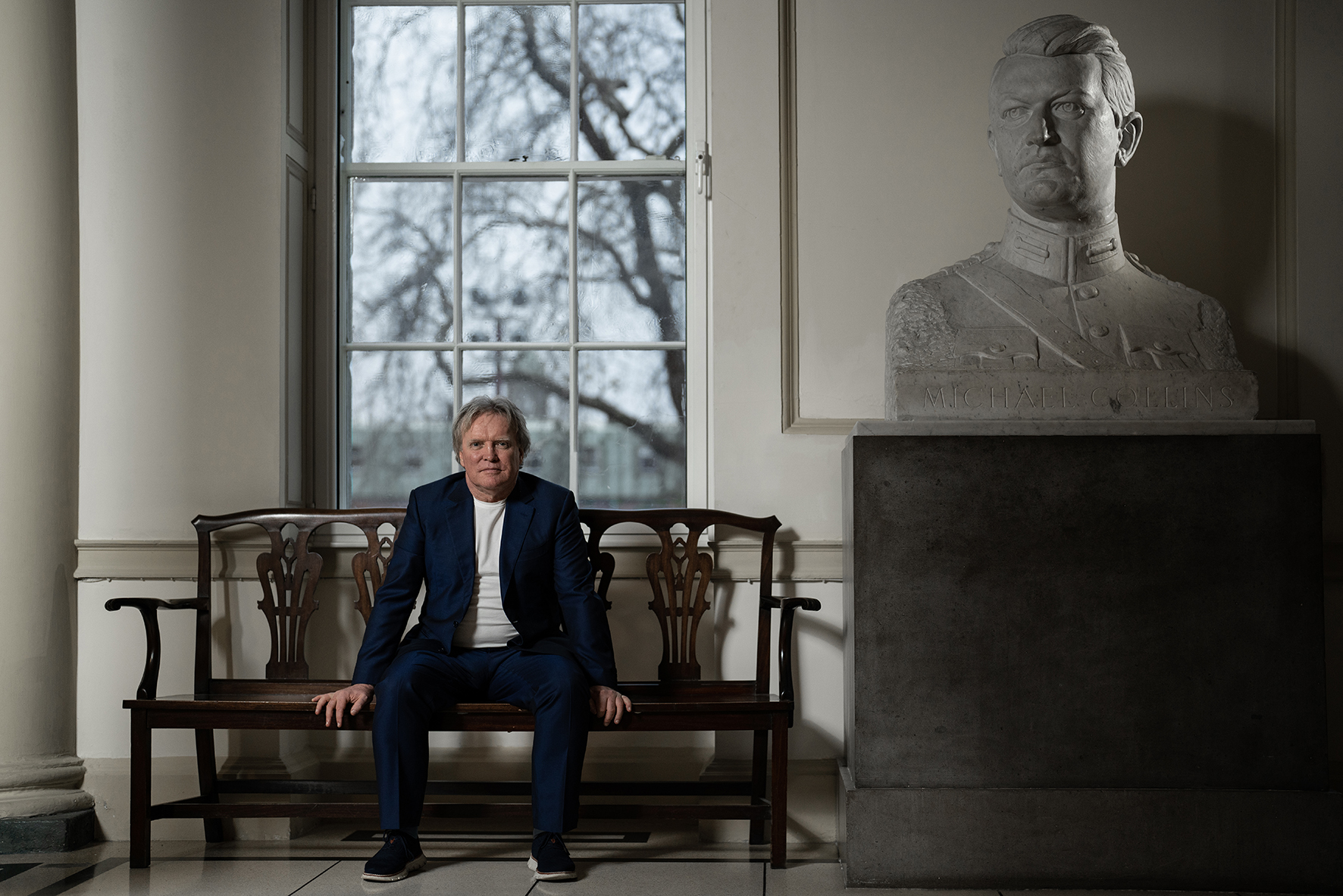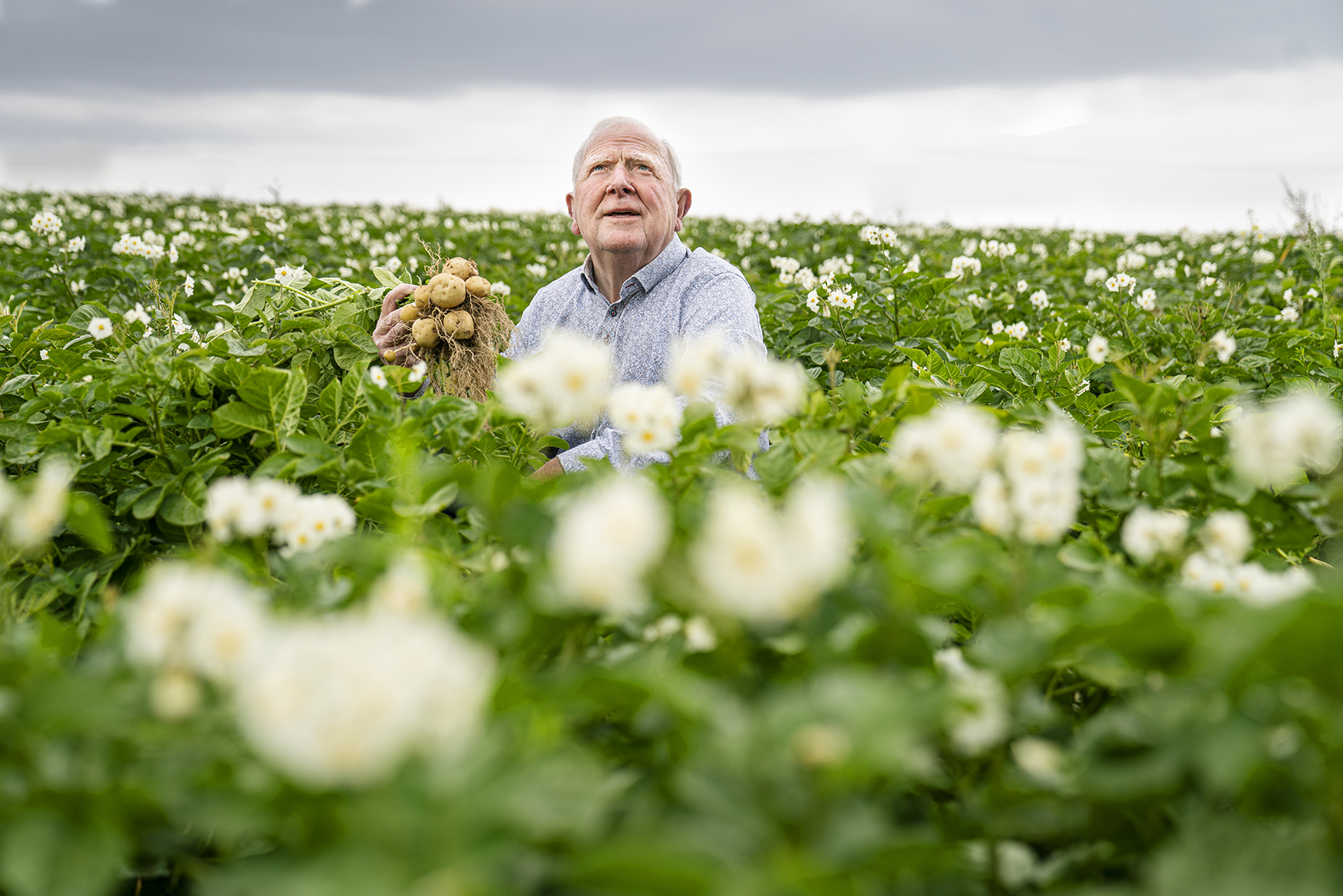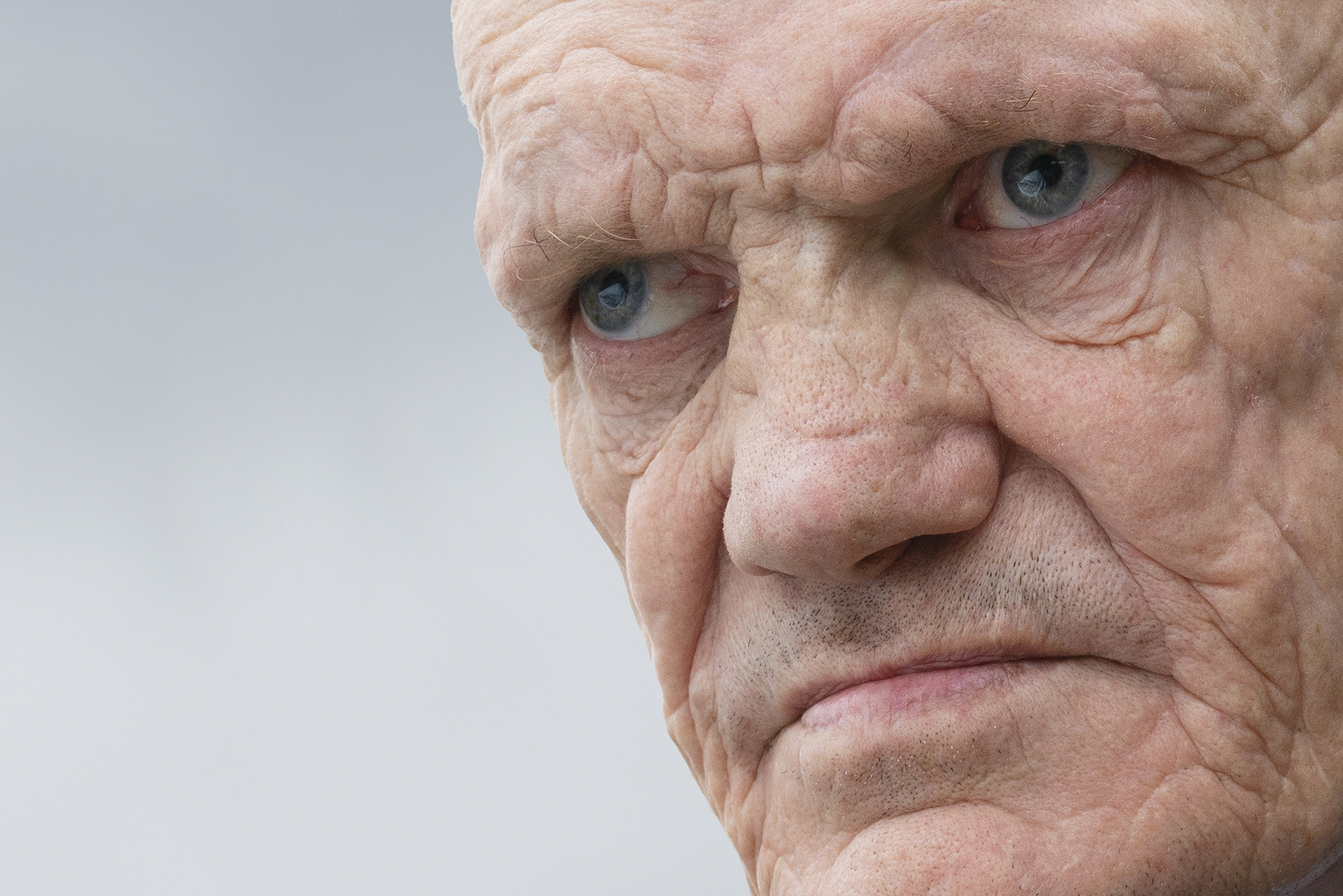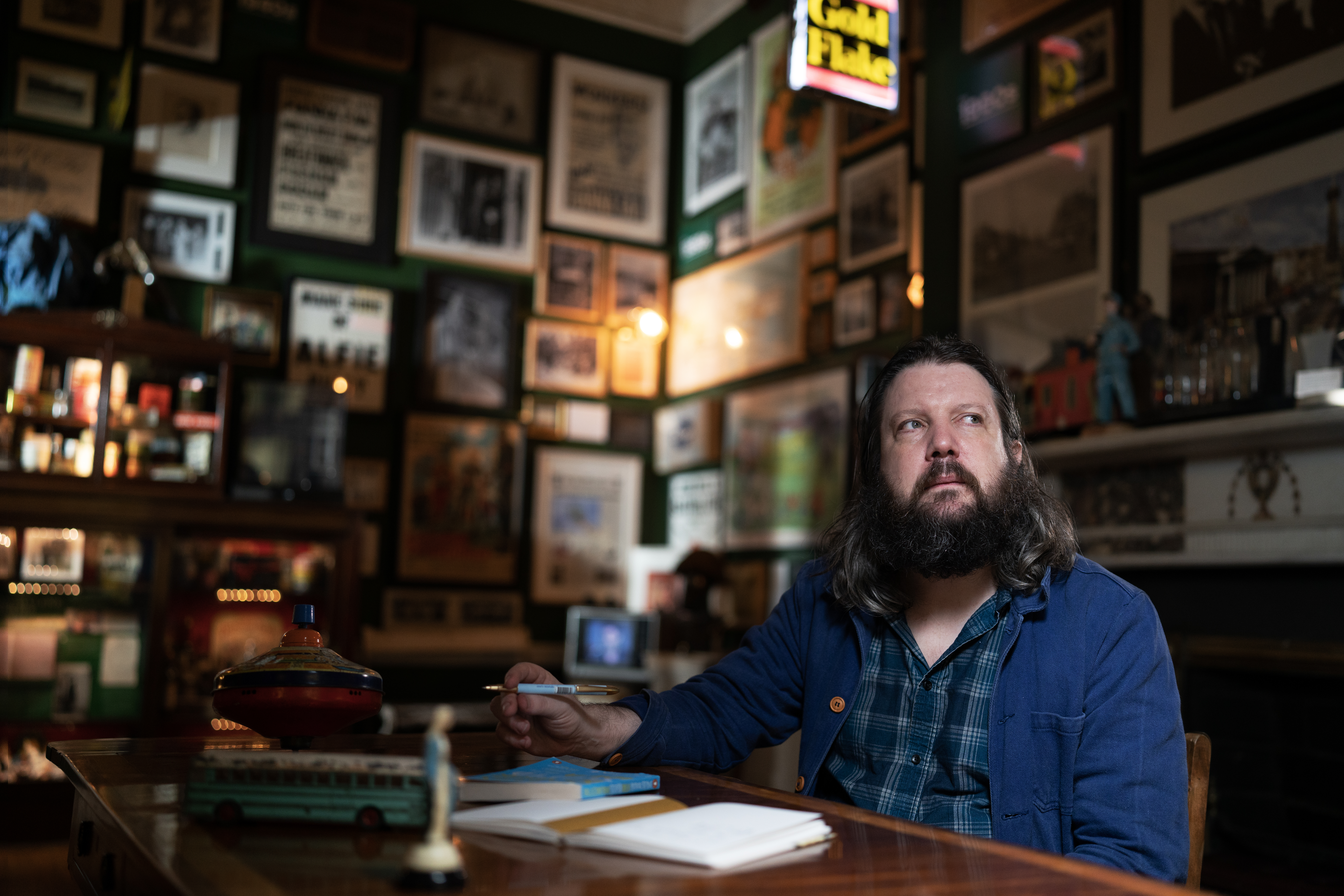PADDY THE
PATRICK BERGIN
The Paddy who dares to be himself
Paddy Oliver is the 43 year old Galway lobster fisherman who rescued two female paddleboarding cousins aged 17 and 23 in 2021 in a miraculous find about 17 miles (27km) from where they first set out. The women had anchored themselves to a lobster pot to prevent them being taken out into the Atlantic.
Paddy is captured by the photographer on his boat about 3 miles off Galway Bay at his early evening routine reeling in the family lobster pots (Name of boat??)
PADDY THE
PATRICK BERGIN
The Paddy who dares to be himself
Paddy Oliver is the 43 year old Galway lobster fisherman who rescued two female paddleboarding cousins aged 17 and 23 in 2021 in a miraculous find about 17 miles (27km) from where they first set out. The women had anchored themselves to a lobster pot to prevent them being taken out into the Atlantic.
Paddy is captured by the photographer on his boat about 3 miles off Galway Bay at his early evening routine reeling in the family lobster pots (Name of boat??)
PADDY THE
PADDY GUILBAUD
The Paddy who dares to be himself
Paddy Oliver is the 43 year old Galway lobster fisherman who rescued two female paddleboarding cousins aged 17 and 23 in 2021 in a miraculous find about 17 miles (27km) from where they first set out. The women had anchored themselves to a lobster pot to prevent them being taken out into the Atlantic.
Paddy is captured by the photographer on his boat about 3 miles off Galway Bay at his early evening routine reeling in the family lobster pots (Name of boat??)
PADDY THE
PADDY GUILBAUD
The Paddy who dares to be himself
Paddy Oliver is the 43 year old Galway lobster fisherman who rescued two female paddleboarding cousins aged 17 and 23 in 2021 in a miraculous find about 17 miles (27km) from where they first set out. The women had anchored themselves to a lobster pot to prevent them being taken out into the Atlantic.
Paddy is captured by the photographer on his boat about 3 miles off Galway Bay at his early evening routine reeling in the family lobster pots (Name of boat??)
PADDY THE MOVIE STAR
PATRICK BERGIN
Patrick Connolly Bergin is an Irish actor and singer perhaps best known for his leading role opposite Julia Roberts in Sleeping with the Enemy and terrorist Kevin O’Donnell in Patriot Games
Patrick Bergin is captured for his portrait in a reflective mood, with a book of his father’s poetry in hand. Patrick Bergin Snr. was a trade unionist and politician and a Labour Party member of Seanad Eireann from 1954 to 1957. A deep connection to Ireland’s emergence as a sovereign nation is stitched into the actor’s identity. His middle name is Connolly and the revolutionary James Connolly’s son Roddy was his godfather. In between retelling the project about his connection to Irish nationalism, Bergin, a witty and articulate raconteur, also divulged an amusing detail about how he secured his most famous film role.
“I was flown to Hollywood off the back of Mountains of the Moon and I know before the casting for Sleeping with the Enemy the ask from production about me was ‘Is he sexy?’ That’s how bluntly these things are discussed in that world. Anyway I went in, did the read, thought I did okay and then as I tried to leave I walked into the broom closet by mistake! The director told me that’s how I got the part,”
PADDY THE MOVIE STAR
PATRICK BERGIN
Patrick Connolly Bergin is an Irish actor and singer perhaps best known for his leading role opposite Julia Roberts in Sleeping with the Enemy and terrorist Kevin O’Donnell in Patriot Games
Patrick Bergin is captured for his portrait in a reflective mood, with a book of his father’s poetry in hand. Patrick Bergin Snr. was a trade unionist and politician and a Labour Party member of Seanad Eireann from 1954 to 1957. A deep connection to Ireland’s emergence as a sovereign nation is stitched into the actor’s identity. His middle name is Connolly and the revolutionary James Connolly’s son Roddy was his godfather. In between retelling the project about his connection to Irish nationalism, Bergin, a witty and articulate raconteur, also divulged an amusing detail about how he secured his most famous film role.
“I was flown to Hollywood off the back of Mountains of the Moon and I know before the casting for Sleeping with the Enemy the ask from production about me was ‘Is he sexy?’ That’s how bluntly these things are discussed in that world. Anyway I went in, did the read, thought I did okay and then as I tried to leave I walked into the broom closet by mistake! The director told me that’s how I got the part,”
PADDY THE FOODIE
PATRICK GUILBAUD
Patrick Guilbaud, a Frenchman who has made Ireland his home, led the change in Ireland’s fine dining scene when he came to Dublin in 1981 and set up his eponymous restaurant.
On Ireland and our food culture, Patrick says “Ireland has such a rich environment for food. Cold currents for the world’s best shellfish. Wild game. Incredible beef because the animals are outside most of the year as they are supposed to be. We still have to import some ingredients but we try as much as possible to source all of our food locally. That is the first sustainable action we can take. To source our produce close to where we cook it.”
PADDY THE FOODIE
PATRICK GUILBAUD
Patrick Guilbaud, a Frenchman who has made Ireland his home, led the change in Ireland’s fine dining scene when he came to Dublin in 1981 and set up his eponymous restaurant.
On Ireland and our food culture, Patrick says “Ireland has such a rich environment for food. Cold currents for the world’s best shellfish. Wild game. Incredible beef because the animals are outside most of the year as they are supposed to be. We still have to import some ingredients but we try as much as possible to source all of our food locally. That is the first sustainable action we can take. To source our produce close to where we cook it.”
PADDY THE FISHERMAN
PADDY OLIVER
Paddy Oliver, 43, Lobster fisherman, Galway City.
In 2020, he rescued paddle-boarders and cousins Ellen Glynn, then 17 and, Sara Feeney, 23, fifteen hours after they were first blown out to sea.
My father’s family were fishermen from Aran and from Galway. His brothers. My Uncles. His father and mother would have originated from Inis Mór and they moved to Galway. There was Olivers for years in the thatched cottages in Claddagh. We would have gone over to the islands a lot when we were younger.
I left school and went fishing after Junior Cert. There’s five boys and two girls and my older brother Ciaran started fishing with my Dad and then joined the fire station along with my other brother. But all the same, he’s always missing with a boat. But I’m the only one who’s a full-time fisherman. I always loved it and I had no interest in school. Being out on the boat is always where I felt very peaceful.
The rescue started early. It was August. I woke up at 7AM and heard there was a search. My brother Dave was on the lifeboat. Because we’re always out on the boat we’d often hear if a rescue was on, we’d be close by and answer the call. I called Dave and he’d been out with the teams all night searching. But they couldn’t find them. Visibility was bad and in the darkness, you’d nearly have to be on top of them to find them.
There was even confusion about what they were on – whether they were on the paddleboards or not.
The coastguard was giving different areas for all the many boats who were searching.
Morgan my son and I were joining the search late so after 8AM by the time we were on the boat. We took it as an opportunity to go a new direction. We headed out between Spiddal and Clare and we were out beyond Furbo between the beach in Furbo and the Aran Islands. We were looking at the direction of the wind. All the time I was thinking “Where do we go?”We were about 12 miles from Galway at this stage. So I put a straight line on the plotter going from the beach in Furbo and the South Sound between the Cliffs in Moher and Inis OIrr. To have something to work off. I said to Morgan “We’ll stay a mile either side of it” so there’s still a big margin for error potentially. The coastguard came on the radio to say there had been a possible sighting. So we said that we were heading that direction and we’d keep a look out. We could have gone left or right. Between the two islands or towards the Cliffs. At this stage we were gone a good few hours. We were watching our fuel driving so fast to cover the area.
In my head, if they’re still on the paddleboards and they’re together they’ll be drifting, they could be going at 2 or 3 knots. In the end, I’d say they went faster – the boards are just like lilos basically. They were flying through the night.
I was on the phone to Gerry Sweeney another fisherman who was also searching when we saw them. I was thinking they could be drifting 20 or 30 miles. As it was, the girls caught the fishing buoy and tied themselves on. Otherwise, they could have been drifting another few hours. They said they caught the buoy when it was light. So 5AM or 6AM. And it was 1PM when we found them. So if not for them doing that, they could have been gone much further out again. If they didn’t catch the buoy they caught they would have been miles out.
The girls made so many decisions that made it possible for them to be saved. Staying together. Tying their boards together. Catching the buoy. Staying there for hours. So many things worked out.
It was Morgan who saw them from the back of the boat. They had paddles up and were waving. They hadn’t seen anyone all night, or heard or seen the helicopter. They were apologising and asking was anyone even looking for them. The girls were weak and tired but were okay. We got Ellen in first. As we did her paddle dropped and she offered to go back in and get it. Haha! I said “Sit down you are going nowhere”. There was a swell, it wasn’t calm. Morgan was great with them. He got them into the wheelhouse, got the oilskins on them and gave them a drink.
The attention afterwards was nearly too much. I think we got a call from Joe Duffy’s radio show. The woman on the other end said “Are you after rescuing the girls. Will you stay on the line?” And I said are you joking I’ve enough to be doing than to be hanging on for him.
But they rang back. I had no interest in it being about us. We wanted to get in and go home.
My wife Suzanne had to deal with the media attention more to me. Our house is right at the harbour so people would be knocking on the door. The RTE van pulled up outside. We understood everyone just wanted to hear the story. Being a father myself. You want to know your child will be okay.
I met Ellen’s mother yesterday in Dunnes. Because they only live around the corner. She’s in Australia now and doing well.
An accident at sea took my cousin Tom just after the rescue, and the shock killed his father, my Uncle Martin. Tom would be the same age as me. After being fishing all our lives, you just have to accept it but it is a terrible loss.
It was one Monday morning. Tom was taking out the pots just as he always had on the boat and got caught.
Now I might be on the boat talking about one thing and we want to enjoy our work and have the craic. But I’m always thinking about them when I’m at sea. The girls were saved one day and a month later that happened. From one extreme to another. It couldn’t help but put what we achieved with helping to find the girls in perspective.
PADDY THE FISHERMAN
PADDY OLIVER
Paddy Oliver, 43, Lobster fisherman, Galway City.
In 2020, he rescued paddle-boarders and cousins Ellen Glynn, then 17 and, Sara Feeney, 23, fifteen hours after they were first blown out to sea.
My father’s family were fishermen from Aran and from Galway. His brothers. My Uncles. His father and mother would have originated from Inis Mór and they moved to Galway. There was Olivers for years in the thatched cottages in Claddagh. We would have gone over to the islands a lot when we were younger.
I left school and went fishing after Junior Cert. There’s five boys and two girls and my older brother Ciaran started fishing with my Dad and then joined the fire station along with my other brother. But all the same, he’s always missing with a boat. But I’m the only one who’s a full-time fisherman. I always loved it and I had no interest in school. Being out on the boat is always where I felt very peaceful.
The rescue started early. It was August. I woke up at 7AM and heard there was a search. My brother Dave was on the lifeboat. Because we’re always out on the boat we’d often hear if a rescue was on, we’d be close by and answer the call. I called Dave and he’d been out with the teams all night searching. But they couldn’t find them. Visibility was bad and in the darkness, you’d nearly have to be on top of them to find them.
There was even confusion about what they were on – whether they were on the paddleboards or not.
The coastguard was giving different areas for all the many boats who were searching.
Morgan my son and I were joining the search late so after 8AM by the time we were on the boat. We took it as an opportunity to go a new direction. We headed out between Spiddal and Clare and we were out beyond Furbo between the beach in Furbo and the Aran Islands. We were looking at the direction of the wind. All the time I was thinking “Where do we go?”We were about 12 miles from Galway at this stage. So I put a straight line on the plotter going from the beach in Furbo and the South Sound between the Cliffs in Moher and Inis OIrr. To have something to work off. I said to Morgan “We’ll stay a mile either side of it” so there’s still a big margin for error potentially. The coastguard came on the radio to say there had been a possible sighting. So we said that we were heading that direction and we’d keep a look out. We could have gone left or right. Between the two islands or towards the Cliffs. At this stage we were gone a good few hours. We were watching our fuel driving so fast to cover the area.
In my head, if they’re still on the paddleboards and they’re together they’ll be drifting, they could be going at 2 or 3 knots. In the end, I’d say they went faster – the boards are just like lilos basically. They were flying through the night.
I was on the phone to Gerry Sweeney another fisherman who was also searching when we saw them. I was thinking they could be drifting 20 or 30 miles. As it was, the girls caught the fishing buoy and tied themselves on. Otherwise, they could have been drifting another few hours. They said they caught the buoy when it was light. So 5AM or 6AM. And it was 1PM when we found them. So if not for them doing that, they could have been gone much further out again. If they didn’t catch the buoy they caught they would have been miles out.
The girls made so many decisions that made it possible for them to be saved. Staying together. Tying their boards together. Catching the buoy. Staying there for hours. So many things worked out.
It was Morgan who saw them from the back of the boat. They had paddles up and were waving. They hadn’t seen anyone all night, or heard or seen the helicopter. They were apologising and asking was anyone even looking for them. The girls were weak and tired but were okay. We got Ellen in first. As we did her paddle dropped and she offered to go back in and get it. Haha! I said “Sit down you are going nowhere”. There was a swell, it wasn’t calm. Morgan was great with them. He got them into the wheelhouse, got the oilskins on them and gave them a drink.
The attention afterwards was nearly too much. I think we got a call from Joe Duffy’s radio show. The woman on the other end said “Are you after rescuing the girls. Will you stay on the line?” And I said are you joking I’ve enough to be doing than to be hanging on for him.
But they rang back. I had no interest in it being about us. We wanted to get in and go home.
My wife Suzanne had to deal with the media attention more to me. Our house is right at the harbour so people would be knocking on the door. The RTE van pulled up outside. We understood everyone just wanted to hear the story. Being a father myself. You want to know your child will be okay.
I met Ellen’s mother yesterday in Dunnes. Because they only live around the corner. She’s in Australia now and doing well.
An accident at sea took my cousin Tom just after the rescue, and the shock killed his father, my Uncle Martin. Tom would be the same age as me. After being fishing all our lives, you just have to accept it but it is a terrible loss.
It was one Monday morning. Tom was taking out the pots just as he always had on the boat and got caught.
Now I might be on the boat talking about one thing and we want to enjoy our work and have the craic. But I’m always thinking about them when I’m at sea. The girls were saved one day and a month later that happened. From one extreme to another. It couldn’t help but put what we achieved with helping to find the girls in perspective.
PADDY THE PROP
PADDY McCARTHY
Paddy McCarthy is the 20 year old Leinster and Ireland U21 prop hoping to follow in Ireland senior team star brother Joe’s footsteps and shape the future of Irish rugby.
Photographed just stepping out of an ice bath, the portrait captures a moment of routine off the pitch, the water of the ice bath a different form of green to embrace.
PADDY THE PROP
PADDY McCARTHY
Paddy McCarthy is the 20 year old Leinster and Ireland U21 prop hoping to follow in Ireland senior team star brother Joe’s footsteps and shape the future of Irish rugby.
Photographed just stepping out of an ice bath, the portrait captures a moment of routine off the pitch, the water of the ice bath a different form of green to embrace.
PADDY THE PARALYMPIAN
PADDY FLANAGAN
Patrick Flanagan is a swimmer and wheelchair-user born with spina bifida who represented Ireland in the 2021 Paralympic Games in Tokyo.
For the portrait, Paddy is captured rising out of the waters of Wicklow’s Glendalough lake – the freedom of the water allowing him to truly take flight.
PADDY THE PARALYMPIAN
PADDY FLANAGAN
Patrick Flanagan is a swimmer and wheelchair-user born with spina bifida who represented Ireland in the 2021 Paralympic Games in Tokyo.
For the portrait, Paddy is captured rising out of the waters of Wicklow’s Glendalough lake – the freedom of the water allowing him to truly take flight.
PADDY THE RAPPER
PADDY LAGOON
Pat Lagoon is a 22 year old rapper and hip-hop artist from Co. Waterford who has achieved global recognition by taste-makers for his laid-back musical style.
Captured in front of one of Waterford’s iconic artistic ‘walls’ the portrait sets the rappers presence in the context of the city that shaped him.
PADDY THE RAPPER
PADDY LAGOON
Pat Lagoon is a 22 year old rapper and hip-hop artist from Co. Waterford who has achieved global recognition by taste-makers for his laid-back musical style.
Captured in front of one of Waterford’s iconic artistic ‘walls’ the portrait sets the rappers presence in the context of the city that shaped him.
PADDY THE PAINTER
PADDY CRITCHLEY
Paddy Critchley, an up-and-coming visual artist from Laois working primarily in paint combining beautiful imagery with politically conscious ideas. Paddy first picked up a paintbrush to work at his father’s practice, house painting.
Paddy’s portrait places the painter and former house painter among the tools and textures of his craft in his studio in Limerick city – among the sketches, paints, books, mementos and influences that shape each piece.
PADDY THE PAINTER
PADDY CRITCHLEY
Paddy Critchley, an up-and-coming visual artist from Laois working primarily in paint combining beautiful imagery with politically conscious ideas. Paddy first picked up a paintbrush to work at his father’s practice, house painting.
Paddy’s portrait places the painter and former house painter among the tools and textures of his craft in his studio in Limerick city – among the sketches, paints, books, mementos and influences that shape each piece.
PADDY THE CHAMELEON
PADDY BLUE
The Paddy who dares to be himself
The 21-year-old self-taught Irish creative makeup artist and content creator is of Polish heritage. His makeup looks, inspired by popular culture, are viewed by millions on social media.
He has collaborated with global brands across technology, lifestyle, and fashion, including Samsung, JD Sport, Morphe and many more, with his work featuring consistently across Irish and international media.
Paddy is an outspoken advocate for the LGBTQ+ community, noting how Ireland’s open society has enabled him to embrace his sexuality.
“When I was growing up, I was told that art couldn’t be a career.
In secondary school, I ended up taking a woodwork class. Eventually, I begged my teachers to let me join the art class.
I began to teach myself special effects makeup from YouTube.
My goal is to push the boundaries of what can be achieved with make-up and special effects.”
PADDY THE CHAMELEON
PADDY BLUE
The Paddy who dares to be himself
The 21-year-old self-taught Irish creative makeup artist and content creator is of Polish heritage. His makeup looks, inspired by popular culture, are viewed by millions on social media.
He has collaborated with global brands across technology, lifestyle, and fashion, including Samsung, JD Sport, Morphe and many more, with his work featuring consistently across Irish and international media.
Paddy is an outspoken advocate for the LGBTQ+ community, noting how Ireland’s open society has enabled him to embrace his sexuality.
“When I was growing up, I was told that art couldn’t be a career.
In secondary school, I ended up taking a woodwork class. Eventually, I begged my teachers to let me join the art class.
I began to teach myself special effects makeup from YouTube.
My goal is to push the boundaries of what can be achieved with make-up and special effects.”
PADDY THE ACTIVIST
PADDY SMYTH
The Paddy who blazed a trail
33 years old. Gay, differently-abled social media and television personality and inclusion activist.
Paddy Smyth appeared on and won the Channel 4 reality show The Circle in 2019 and presented a 6 part limited series for RTE 2. (The Fitting Room) in the same year.
His down to earth honesty and ability to challenge mainstream media for more representation of marginalised groups has seen him front influencer campaigns for a range of brands and projects
How has Ireland changed in your lifetime?
“When you hear the word Paddy, you don’t think if an Irish disability activist who’s gay. I’m Paddy many things. Modern Ireland is diverse”
About the Portrait:
Photographed in the heart of Temple Bar where Paddy lives, it shows a young man in the prime of his life basking in the neon glow of a city where he has made his name and made his mark.
33 years old. Gay, differently-abled social media and television personality and inclusion activist.
Paddy Smyth appeared on and won the Channel 4 reality show The Circle in 2019 and presented a 6 part limited series for RTE 2. (The Fitting Room) in the same year.
His down to earth honesty and ability to challenge mainstream media for more representation of marginalised groups has seen him front influencer campaigns for a range of brands and projects
How has Ireland changed in your lifetime?
“When you hear the word Paddy, you don’t think if an Irish disability activist who’s gay. I’m Paddy many things. Modern Ireland is diverse”
About the Portrait:
Photographed in the heart of Temple Bar where Paddy lives, it shows a young man in the prime of his life basking in the neon glow of a city where he has made his name and made his mark.
PADDY THE ILLUSTRATOR
PADDY DONNELLY
The Paddy inspired by our island’s beauty
Born in Ballycastle. Lives in Hasselt in Belgium.
Paddy is photographed sitting at Fair Head and at The Vanishing Lake, both in his homeplace the inspiration for so much of his work.
“Ballycastle is a really beautiful part of the country, full of myths and legends like the Giants Causeway, a spectacular place to grow up.
“When I started I made a list of all the things I really loved to illustrate – dinosaurs and the sea, Irish scenery, birds, extinct animals – I’m really fascinated by those.
My book The Vanishing Lake, is the first one I’d written and illustrated, first published in Chinese not English in 2020 and then published in the US in 2021. It has been awarded both in America and in China, where it was named in the best children’s books list.
What is it to be Irish abroad?
Now I play hurling where I live in Belgium – I play for Belgium GAA and we’ve won the European championship 5 times, mostly against Luxembourg.
If you’re abroad and you meet other Irish people, it’s “Can you hurl?” “Can you kick a ball?” and that’s a nice way to keep a connection with people back home.
PADDY THE ILLUSTRATOR
PADDY DONNELLY
The Paddy inspired by our island’s beauty
Born in Ballycastle. Lives in Hasselt in Belgium.
Paddy is photographed sitting at Fair Head and at The Vanishing Lake, both in his homeplace the inspiration for so much of his work.
“Ballycastle is a really beautiful part of the country, full of myths and legends like the Giants Causeway, a spectacular place to grow up.
“When I started I made a list of all the things I really loved to illustrate – dinosaurs and the sea, Irish scenery, birds, extinct animals – I’m really fascinated by those.
My book The Vanishing Lake, is the first one I’d written and illustrated, first published in Chinese not English in 2020 and then published in the US in 2021. It has been awarded both in America and in China, where it was named in the best children’s books list.
What is it to be Irish abroad?
Now I play hurling where I live in Belgium – I play for Belgium GAA and we’ve won the European championship 5 times, mostly against Luxembourg.
If you’re abroad and you meet other Irish people, it’s “Can you hurl?” “Can you kick a ball?” and that’s a nice way to keep a connection with people back home.
PADDY THE SHEARER
PADDY LIAM O’BRIEN
The Paddy who’s sheared 200,000 sheep
80 years old. Sheep farmer and former top Australian sheep-shearer.
Born on the border of Galway and Mayo in 1941, Paddy Liam O’Brien is from a family of 5 boys and 2 girls. He spent 25 years in Australia, and the bulk of his 20’s as a top sheep shearer in the Outback.
Paddy sheared 200 sheep a day. 4,000 a month. At a conservative estimate, Paddy Liam was shearing 36,000 sheep a month in his Outback heyday.
“You’d be 200 miles from the nearest town. Live in a camp with the lads. That was the way of life in the Outback, it was a rough life really.
“There was only 11 million people when I was there (in Australia). Now there’s 25 million.”
Why are you named Paddy?
“Well in the olden days every second child would be named Paddy because there’d be 6 or 8 kids in every family”
How has Ireland changed in your lifetime?
“When we left Ireland, there was nothing in it. Hard old times. Lamb would be worth ten bob. I didn’t see any future in it, but now it’s gone the other way.”
PADDY THE SHEARER
PADDY LIAM O’BRIEN
The Paddy who’s sheared 200,000 sheep
80 years old. Sheep farmer and former top Australian sheep-shearer.
Born on the border of Galway and Mayo in 1941, Paddy Liam O’Brien is from a family of 5 boys and 2 girls. He spent 25 years in Australia, and the bulk of his 20’s as a top sheep shearer in the Outback.
Paddy sheared 200 sheep a day. 4,000 a month. At a conservative estimate, Paddy Liam was shearing 36,000 sheep a month in his Outback heyday.
“You’d be 200 miles from the nearest town. Live in a camp with the lads. That was the way of life in the Outback, it was a rough life really.
“There was only 11 million people when I was there (in Australia). Now there’s 25 million.”
Why are you named Paddy?
“Well in the olden days every second child would be named Paddy because there’d be 6 or 8 kids in every family”
How has Ireland changed in your lifetime?
“When we left Ireland, there was nothing in it. Hard old times. Lamb would be worth ten bob. I didn’t see any future in it, but now it’s gone the other way.”
PADDY THE DYNASTY
PADDY, PADDY, PADDY, AND PADDY MCKILLEN
The Paddys who have built a legacy
Paddy The Dynasty – Paddy, Paddy, Paddy & Paddy McKillen
Paddy McKillen Jr, 40 years, hotelier and business owner from Dublin.
How do you feel about being called Paddy?
I am very proud to be called Paddy, it is a generational honour that was passed down to me and that I have continued into the next generation of the McKillen family.
Why did you decide to take part in the project?
It was a great opportunity to support and be part of an artistic and cultural project that shines a positive light on contemporary Ireland, and to capture the four generations of Paddy’s in our family.
What do you feel about the finished photo?
It is superb, it really captures an intimate moment, the connected but unique personalities of each of us, from my grandfather to my father, myself, and my son. It is especially treasured now, as my grandfather passed away shortly after the photograph was taken.
How has Ireland changed in your lifetime?
We have become a much more confident, diverse, and open-minded society.
About the portrait:
The McKillens are captured in the Richard Rogers designed gallery in Chateau La Coste in the South of France. It is the last time all four generations were captured together. Grandad Paddy passed just after the photo was taken, at the age of 98
PADDY THE DYNASTY
PADDY, PADDY, PADDY AND PADDY MCKILLEN
The Paddys who have built a legacy
Paddy The Dynasty – Paddy, Paddy, Paddy & Paddy McKillen
Paddy McKillen Jr, 40 years, hotelier and business owner from Dublin.
How do you feel about being called Paddy?
I am very proud to be called Paddy, it is a generational honour that was passed down to me and that I have continued into the next generation of the McKillen family.
Why did you decide to take part in the project?
It was a great opportunity to support and be part of an artistic and cultural project that shines a positive light on contemporary Ireland, and to capture the four generations of Paddy’s in our family.
What do you feel about the finished photo?
It is superb, it really captures an intimate moment, the connected but unique personalities of each of us, from my grandfather to my father, myself, and my son. It is especially treasured now, as my grandfather passed away shortly after the photograph was taken.
How has Ireland changed in your lifetime?
We have become a much more confident, diverse, and open-minded society.
About the portrait:
The McKillens are captured in the Richard Rogers designed gallery in Chateau La Coste in the South of France. It is the last time all four generations were captured together. Grandad Paddy passed just after the photo was taken, at the age of 98
PADDY THE ACTOR
PADDY MARTINS
The Paddy who is a star
Of Nigerian origin, Martins moved to Ireland when he was five where he was brought up with his three siblings by their mother Mabel in Swords, a suburb just north of Dublin. Unsure what to do during his Leaving Cert, his mother suggested he try acting. He went on to graduate with a Bachelor of Arts in Acting from The Lir Academy at Trinity College Dublin in 2019. In the 2022 Abbey Theatre production of An Octoroon he took the starring role, the first actor from his heritage and background to do so.
About the portrait
Patrick is photographed in the iconic inner city chip shop Fusco’s, a scene unchanged from the 1970s, and where many a great bit of dialogue was heard.
PADDY THE ACTOR
PADDY MARTINS
The Paddy who is a star
Of Nigerian origin, Martins moved to Ireland when he was five where he was brought up with his three siblings by their mother Mabel in Swords, a suburb just north of Dublin. Unsure what to do during his Leaving Cert, his mother suggested he try acting. He went on to graduate with a Bachelor of Arts in Acting from The Lir Academy at Trinity College Dublin in 2019. In the 2022 Abbey Theatre production of An Octoroon he took the starring role, the first actor from his heritage and background to do so.
About the portrait
Patrick is photographed in the iconic inner city chip shop Fusco’s, a scene unchanged from the 1970s, and where many a great bit of dialogue was heard.
PADDY THE ASTROPHYSICIST
PADDY KAVANAGH
The Paddy exploring the beginnings of time
Paddy Kavanagh is an astrophysicist working for the Dublin Institute for Advanced Studies, working on the James Webb Space Telescope project. The Webb is the successor to the Hubble Space Telescope and was successfully launched by NASA at Christmas 2021.
Paddy left school at 16 to help take care of his younger siblings after his parents separated.
“I was always interested in space, I’d be hanging out the bedroom window looking up at the stars. When I was 12 or 13 I got one of those cheap telescopes they used to sell in the opticians and camera shops.”
“For my 21st, my mother bought me a very expensive telescope – a really good one.”
“Being an astrophysicist is being a problem solver. The big goal is understand our place in the universe.”
“More than anything, to understand how the sun formed, how the stars formed, where the metals in our bodies come from – the metals in our bodies come from supernova explosions so we want to know more about that, the material in interstellar space that goes on to become planets and people and life… to know more about the overall picture of how and why the universe does and our place in it.”
“My parents had separated when I was 16, I worked in a bar and at some point I drifted away from school.”
“I never went in, I just worked. I tried to repeat 5th year but I couldn’t seem to finish it.”
“I was always good in school, not stellar but good and my Mum knew I could do well if I stuck at it.”
“She basically tricked me into doing 6th year. She said I could do an access course at the local further education course rather than go to school and have to do the uniform – I was 18 or 19.”
“Then the first day of term, she threw the uniform at me and said get up to school. And that was me sorted.”
“She didn’t want me to leave it because she knew I could do anything I wanted to if I put my mind to it.”
How has Ireland changed in your lifetime?
“Ireland has become a much more open and accepting society. Anybody from any background can become successful. Someone from my background – I grew up in a council house – would never have made inroads in my academic field 50 years ago.
“Without the suspension of third level university fees when I went to college. I could never have been studying our Universe and the origins of the stars in a million years.”
PADDY THE ASTROPHYSICIST
PADDY KAVANAGH
The Paddy exporing the beginnings of time
Paddy Kavanagh is an astrophysicist working for the Dublin Institute for Advanced Studies, working on the James Webb Space Telescope project. The Webb is the successor to the Hubble Space Telescope and was successfully launched by NASA at Christmas 2021.
Paddy left school at 16 to help take care of his younger siblings after his parents separated.
“I was always interested in space, I’d be hanging out the bedroom window looking up at the stars. When I was 12 or 13 I got one of those cheap telescopes they used to sell in the opticians and camera shops.”
“For my 21st, my mother bought me a very expensive telescope – a really good one.”
“Being an astrophysicist is being a problem solver. The big goal is understand our place in the universe.”
“More than anything, to understand how the sun formed, how the stars formed, where the metals in our bodies come from – the metals in our bodies come from supernova explosions so we want to know more about that, the material in interstellar space that goes on to become planets and people and life… to know more about the overall picture of how and why the universe does and our place in it.”
“My parents had separated when I was 16, I worked in a bar and at some point I drifted away from school.”
“I never went in, I just worked. I tried to repeat 5th year but I couldn’t seem to finish it.”
“I was always good in school, not stellar but good and my Mum knew I could do well if I stuck at it.”
“She basically tricked me into doing 6th year. She said I could do an access course at the local further education course rather than go to school and have to do the uniform – I was 18 or 19.”
“Then the first day of term, she threw the uniform at me and said get up to school. And that was me sorted.”
“She didn’t want me to leave it because she knew I could do anything I wanted to if I put my mind to it.”
How has Ireland changed in your lifetime?
“Ireland has become a much more open and accepting society. Anybody from any background can become successful. Someone from my background – I grew up in a council house – would never have made inroads in my academic field 50 years ago.
“Without the suspension of third level university fees when I went to college. I could never have been studying our Universe and the origins of the stars in a million years.”
PADDY THE FOUNDER
PADDY DUNNING
The Paddy who dares to dream
Paddy Dunning, 57, is an Art and Music Entrepreneur.
Born Holles Street on 3rd October 1965, Paddy was instrumental in the creation of Temple Bar as an artistic hub in Dublin city. He is the owner and founder of The Button Factory and Dublin’s Wax Museum as well as Grouse Lodge recording studios in Westmeath where everyone from Manic Street Preachers to Michael Jackson have stayed and recorded. His interests remain broad and include work on a global audio visual art sculpture called The Giant.
“I was born and raised in Dublin but I’ve always had one leg in Dublin and one leg in the Midlands. My mother was from Westmeath. My father was from Arbour Hill, the son of an Athlonian who had come to Dublin and worked as a tram driver.”
“My current project is The Giant Project. It’s the reason I have a giant head in my shed. That’s the prototype. We’re launching 22 statues in 22 locations for the end of 2022. We have Miami, Chicago, Dubai signing up. Building statues bigger than the Statue of Liberty. They’re a sculpture, a platform, a venue and we can project on to them to turn them into a giant of sport or art of culture and also turn into the visitor and you can send out a message to the world. We want to connect the people of the world, connecting us to each other and the fate of the planet”
“The giant is inspired by Gulliver’s Travels. Lilliput is in Westmeath, and Swift wrote part of Gulliver’s Travels there. What attracts me to a project like this is people saying ‘You can’t do it’. After that it’s just about enjoying the journey.”
“Back in the 1980’s Dublin’s Temple Bar was a run down, no go area. The plan was to demolish the whole area – the oldest part of the city – and built a dirty great bus station. Myself and twelve of us set up the Temple Bar Development Council to lobby government preserve the oldest part of the city instead. We got legislation through government to incentivise the area, build 23 cultural centres facilitating thousands of artists.”
“When I’m going in to work in Temple Bar I’m walking past art galleries, restaurants and still there’s masses of creativity going on in those buildings. It’s an honour to have played a part in the establishment of Temple Bar, in the preservation of Temple Bar”
Paddy Dunning, 57, is an Art and Music Entrepreneur.
Born Holles Street on 3rd October 1965, Paddy was instrumental in the creation of Temple Bar as an artistic hub in Dublin city. He is the owner and founder of The Button Factory and Dublin’s Wax Museum as well as Grouse Lodge recording studios in Westmeath where everyone from Manic Street Preachers to Michael Jackson have stayed and recorded. His interests remain broad and include work on a global audio visual art sculpture called The Giant.
“I was born and raised in Dublin but I’ve always had one leg in Dublin and one leg in the Midlands. My mother was from Westmeath. My father was from Arbour Hill, the son of an Athlonian who had come to Dublin and worked as a tram driver.”
“My current project is The Giant Project. It’s the reason I have a giant head in my shed. That’s the prototype. We’re launching 22 statues in 22 locations for the end of 2022. We have Miami, Chicago, Dubai signing up. Building statues bigger than the Statue of Liberty. They’re a sculpture, a platform, a venue and we can project on to them to turn them into a giant of sport or art of culture and also turn into the visitor and you can send out a message to the world. We want to connect the people of the world, connecting us to each other and the fate of the planet”
“The giant is inspired by Gulliver’s Travels. Lilliput is in Westmeath, and Swift wrote part of Gulliver’s Travels thereWhat attracts me to a project like this is people saying ‘You can’t do it’. After that it’s just about enjoying the journey.”
“Back in the 1980’s Dublin’s Temple Bar was a run down, no go area. The plan was to demolish the whole area – the oldest part of the city – and built a dirty great bus station. Myself and twelve of us set up the Temple Bar Development Council to lobby government preserve the oldest part of the city instead. We got legislation through government to incentivise the area, build 23 cultural centres facilitating thousands of artists.”
“When I’m going in to work in Temple Bar I’m walking past art galleries, restaurants and still there’s masses of creativity going on in those buildings. It’s an honour to have played a part in the establishment of Temple Bar, in the preservation of Temple Bar”
PADDY THE ARCHITECT
PADDY BRADLEY
The Paddy who built a wonder
Paddy Bradley, 43 is an architect and part time farmer from Co. Derry. He is best know for building a house from shipping containers on the family farm. The house and its story was voted the most popular episode every of long running UK television programme Grand Designs.
I have always lived in Derry in the North of Ireland.. It’s my parents James and Ann and I’m the eldest and only boy with two sisters.
We come from a very small farm with a few cattle and a few sheep. The farm has been in the family since we obtained it from the landlords in around 1800.
My father has always been a farmer and always will be. It’s in your DNA coming from a farming background that you understand you will take on the farm.
We have beef cattle and sheep and it was magical to grow up on the farm. We knew about the troubles but our parents protected us from that. You wandered the fields and the land, walking through fields and rivers for miles it was paradise, we had freedom.
I don’t know why I wanted to end up in architecture – my mother maybe – she always had a great interest in houses and buildings when she took us on days out.
Eventually, after college and some early and formative placements I started to design my own house, in the middle of the night. It had been in my head so long that I got it all done quickly. And I thought if you can’t go crazy here – show people what you can do.
I went on the Channel 4 Grand Designs show because it might help me get suppliers to partner with me to afford the house I wanted to build.
The idea was to really educate people what you can do – that’s the main goal – great architecture will enhance lives and make people happy. We all want to be happy and one way to be happy is to live in great architecture. You’re creating something for people to be happy in. It can change peoples lives to wake up and see so much light, it’s good for mental health.
The process of the build and the filming took on a life of its own.
Very quickly I forgot about the cameras – it became a family between the contractors and the crew. My three best friends came from the house – the builder, my mortgage guy and the landscaper are my three best friends. Architecture brought us together.
It was stressful but I do that with goals. I set it and I’ll do it.
Building the house got me three best friends, a career and eventually it’s how I met my wife.
And I remember when Ross first mentioned the idea of Paddy Irishman. It was at my kitchen table in the middle of the filming – he talked about the idea of different Paddies who have all done interesting things.
I’m humbled that the idea came from my story. Very humbled. You have to be.
What is important to hold on to about Ireland?
For me to say I’m a Paddy from Ireland I think its one of the greatest things you can say. We are a friendly people but we all strive to better themselves – it’s just where we’ve come from. We were colonised so when we started to have freedom to develop we keep trying to better ourselves – in sport or in art – when we got our freedom as a people you couldn’t stop us. We pushed ourselves.
I’m 43 and I have always lived in Derry in the North of Ireland. I come from a farming background. My mother James and Ann I’m the eldest and only boy with two sisters.
We come from a very small farm with a few cattle and a few sheep. The farm has been in the family since we obtained it from the landlords in around 1800.
My father has always been a farmer and always will be. It’s in your DNA coming from a farming background that you understand you will take on the farm.
We have beef cattle and sheep and it was magical to grow up on the farm. We knew about the troubles but our parents protected us from that. You wandered the fields and the land, walking through fields and rivers for miles it was paradise, we had freedom.
I don’t know why I wanted to end up in architecture – my mother maybe – she always had a great interest in houses and buildings when she took us on days out.
I was told in school architecture would be difficult but I always wanted to prove somebody wrong. I had loved playing GAA but I had to stop playing and that drive in me wanted to do something more. I wanted to design buildings.
PADDY THE ARCHITECT
PADDY BRADLEY
The Paddy who built a wonder
Paddy Bradley, 43 is an architect and part time farmer from Co. Derry. He is best know for building a house from shipping containers on the family farm. The house and its story was voted the most popular episode every of long running UK television programme Grand Designs.
I have always lived in Derry in the North of Ireland.. It’s my parents James and Ann and I’m the eldest and only boy with two sisters.
We come from a very small farm with a few cattle and a few sheep. The farm has been in the family since we obtained it from the landlords in around 1800.
My father has always been a farmer and always will be. It’s in your DNA coming from a farming background that you understand you will take on the farm.
We have beef cattle and sheep and it was magical to grow up on the farm. We knew about the troubles but our parents protected us from that. You wandered the fields and the land, walking through fields and rivers for miles it was paradise, we had freedom.
I don’t know why I wanted to end up in architecture – my mother maybe – she always had a great interest in houses and buildings when she took us on days out.
Eventually, after college and some early and formative placements I started to design my own house, in the middle of the night. It had been in my head so long that I got it all done quickly. And I thought if you can’t go crazy here – show people what you can do.
I went on the Channel 4 Grand Designs show because it might help me get suppliers to partner with me to afford the house I wanted to build.
The idea was to really educate people what you can do – that’s the main goal – great architecture will enhance lives and make people happy. We all want to be happy and one way to be happy is to live in great architecture. You’re creating something for people to be happy in. It can change peoples lives to wake up and see so much light, it’s good for mental health.
The process of the build and the filming took on a life of its own.
Very quickly I forgot about the cameras – it became a family between the contractors and the crew. My three best friends came from the house – the builder, my mortgage guy and the landscaper are my three best friends. Architecture brought us together.
It was stressful but I do that with goals. I set it and I’ll do it.
Building the house got me three best friends, a career and eventually it’s how I met my wife.
And I remember when Ross first mentioned the idea of Paddy Irishman. It was at my kitchen table in the middle of the filming – he talked about the idea of different Paddies who have all done interesting things.
I’m humbled that the idea came from my story. Very humbled. You have to be.
What is important to hold on to about Ireland?
For me to say I’m a Paddy from Ireland I think its one of the greatest things you can say. We are a friendly people but we all strive to better themselves – it’s just where we’ve come from. We were colonised so when we started to have freedom to develop we keep trying to better ourselves – in sport or in art – when we got our freedom as a people you couldn’t stop us. We pushed ourselves.
I’m 43 and I have always lived in Derry in the North of Ireland. I come from a farming background. My mother James and Ann I’m the eldest and only boy with two sisters.
We come from a very small farm with a few cattle and a few sheep. The farm has been in the family since we obtained it from the landlords in around 1800.
My father has always been a farmer and always will be. It’s in your DNA coming from a farming background that you understand you will take on the farm.
We have beef cattle and sheep and it was magical to grow up on the farm. We knew about the troubles but our parents protected us from that. You wandered the fields and the land, walking through fields and rivers for miles it was paradise, we had freedom.
I don’t know why I wanted to end up in architecture – my mother maybe – she always had a great interest in houses and buildings when she took us on days out.
I was told in school architecture would be difficult but I always wanted to prove somebody wrong. I had loved playing GAA but I had to stop playing and that drive in me wanted to do something more. I wanted to design buildings.
PADDY THE PERSONALITY
PADDY KIELTY
The Paddy who sees the future
Born in Dundrum, Co. Down, Patrick began his stand-up career as host of Northern Ireland’s first comedy club, The Empire Laughs Back, in pre-ceasefire Belfast.
An award-winning stand up, 2023 sees the release of his first feature film, Ballywalter, where he plays the role of Shane alongside IFTA nominated Seána Kerslake.
I grew up in Dundrum, Co. Down but the Kielty side of my family were originally from Wexford. It was my great-grandfather who moved from Wexford to Co. Down before the border was drawn.
He and his brother were put into the Artane Boys School from 1905 to 1910 as their mother had died and their father was unable to care for them due to his epilepsy.
After Artane, his cousins in Rostrevor in Co. Down offered him a job and so he ended up coming to the Mourne mountains and marrying into my great grandmother’s fishing family just before the Easter rising.
The border has dominated so many people’s lives where I grew up so I’ve always found it interesting that my great grandfather though he was just moving from one Irish county to another before finding himself in a different country thanks to partition.
My father’s death in the troubles when I was 16, was of course the thing that has made me who I am today but when you’re growing up in a conflict one of the things you realise is everyone has a story – about a relation, a friend or a neighbour that they lost. For a long time, I didn’t talk about it as I didn’t want people back home to think I saw my story as special.
But over the course of the years I now realise that sharing my experience helps other people share theirs.
I also used to think so many people died for nothing during the conflict.
But more recently I think they all died so we could have peace – unbeknown to us at the time, there was a tipping point when people decided we can’t do this any more – there has to be another way. So while it might sound odd, I now see every death as ultimately being part of the collective pain that eventually brought the peace we’re now enjoying.
It’s one of the reasons I think it’s important to celebrate peace and the people we lost to have it. And to protect the future for those coming next.
PADDY THE PERSONALITY
PADDY KIELTY
The Paddy who sees the future
Born in Dundrum, Co. Down, Patrick began his stand-up career as host of Northern Ireland’s first comedy club, The Empire Laughs Back, in pre-ceasefire Belfast.
An award-winning stand up, 2023 sees the release of his first feature film, Ballywalter, where he plays the role of Shane alongside IFTA nominated Seána Kerslake.
I grew up in Dundrum, Co. Down but the Kielty side of my family were originally from Wexford. It was my great-grandfather who moved from Wexford to Co. Down before the border was drawn.
He and his brother were put into the Artane Boys School from 1905 to 1910 as their mother had died and their father was unable to care for them due to his epilepsy.
After Artane, his cousins in Rostrevor in Co. Down offered him a job and so he ended up coming to the Mourne mountains and marrying into my great grandmother’s fishing family just before the Easter rising.
The border has dominated so many people’s lives where I grew up so I’ve always found it interesting that my great grandfather though he was just moving from one Irish county to another before finding himself in a different country thanks to partition.
My father’s death in the troubles when I was 16, was of course the thing that has made me who I am today but when you’re growing up in a conflict one of the things you realise is everyone has a story – about a relation, a friend or a neighbour that they lost. For a long time, I didn’t talk about it as I didn’t want people back home to think I saw my story as special.
But over the course of the years I now realise that sharing my experience helps other people share theirs.
I also used to think so many people died for nothing during the conflict.
But more recently I think they all died so we could have peace – unbeknown to us at the time, there was a tipping point when people decided we can’t do this any more – there has to be another way. So while it might sound odd, I now see every death as ultimately being part of the collective pain that eventually brought the peace we’re now enjoying.
It’s one of the reasons I think it’s important to celebrate peace and the people we lost to have it. And to protect the future for those coming next.
PADDY THE SCHOOLBOY
PADDY SCOTT
The Paddy who is growing up differently.
Paddy Scott lives in Ballinahinch in Northern Ireland, and goes to school in an integrated one where those from Catholic and Protestant traditions are educated together, a concept mainstream now 25 years since the signing of the Good Friday (Belfast) agreement.
His grandfather is a keen pigeon racer and Paddy has his own shed in the garden where he keeps his own.
PADDY THE SCHOOLBOY
PADDY SCOTT
The Paddy who is growing up differently
Paddy Scott lives in Ballinahinch in Northern Ireland, and goes to school in an integrated one where those from Catholic and Protestant traditions are educated together, a concept mainstream now 25 years since the signing of the Good Friday (Belfast) agreement.
His grandfather is a keen pigeon racer and Paddy has his own shed in the garden where he keeps his own.
PADDY THE PRISONER
PADDY HILL
The Paddy who freed himself
Paddy Joe Hill is 77 years of age. He was falsely convicted with 5 other men of the 1974 Birmingham pub openings, serving sixteen and a half years in prison.
He now works with some the relatives of those killed in the bombings through the organisation he set up on release the Miscarriages of Justice Organisation, the only one in the UK & Ireland.
Living on a farm in rural Scotland with his wife he takes pride in his horses and donkeys and the nature that surrounds the house as far as the eye can see.
“We left Belfast in 1960. My mother and father were already over there.
People forget there were signs on lodging factories and on lodgings ‘No Paddies’ I rebelled against that. It was a very hostile environment in England at that time. I wanted to go home most of the time, but I stayed because my family were there.”
“I went to jail 6 weeks before my 30th birthday and 2 weeks before my son’s second birthday.”
“Your innocence keeps you going…it’s a myth that everybody in jail says they’re innocent there’s very few people who can keep it up day in day out week after week year after year. If you’re innocent you will fight everyday of your life in prison until you get exonerated.
PADDY THE PRISONER
PADDY HILL
The Paddy who freed himself
Paddy Joe Hill is 77 years of age. He was falsely convicted with 5 other men of the 1974 Birmingham pub openings, serving sixteen and a half years in prison.
He now works with some the relatives of those killed in the bombings through the organisation he set up on release the Miscarriages of Justice Organisation, the only one in the UK & Ireland.
Living on a farm in rural Scotland with his wife he takes pride in his horses and donkeys and the nature that surrounds the house as far as the eye can see.
“We left Belfast in 1960. My mother and father were already over there.
People forget there were signs on lodging factories and on lodgings ‘No Paddies’ I rebelled against that. It was a very hostile environment in England at that time. I wanted to go home most of the time, but I stayed because my family were there.”
“I went to jail 6 weeks before my 30th birthday and 2 weeks before my son’s second birthday.”
“Your innocence keeps you going…it’s a myth that everybody in jail says they’re innocent there’s very few people who can keep it up day in day out week after week year after year. If you’re innocent you will fight everyday of your life in prison until you get exonerated.
PADDY THE STUDENT
PADDY O’REILLY
The Paddy who battled to get an education
Patrick struggled with secondary school, leaving halfway through second year at just 14 to take general labour jobs, including in a meat factory.
Later while working in Traveller representation at Pavee Point he got the opportunity to attend third level education through an access course to Maynooth University.
Through his studies he has gained qualifications and confidence, speaking on and fighting for support for Traveller rights from Ireland’s Seanad to Geneva.
“When I was born, my father and mother, they had camped in what was called the car park in Navan and they were living in trailers, mobile homes. So in 1981, they were given a house. There were twelve traveller specific houses that were from the extended family. All twelve were the one family, say, extended.
I went to both primary school and secondary school in Navan. When I went to secondary school, unfortunately, I just struggled big time. I just couldn’t grasp it, I didn’t want to be there.”
“I wasn’t sorry leaving school but I was much later on”
“Going forward, my ambition would be someday to lecture in Maynooth to students on traveller health. Traveller health is at crisis stage and traveller men live 15 years less than settled men. Traveller women lives twelve years less than settled women. If those stats were in one particular town, there’ll be an emergency plan rolled out and put in place, and I would love to someday come back and lecture around the social determinants of Traveller Health.”
Why did you want to be involved in Paddy Irishman?
I like the idea of Patrick’s all over Ireland and I was really taken by the “No Patrick or Paddy or Pat are the same.” I really wanted to get involved in that because I strongly believe that there is different Patricks and being a traveller, I wanted to share my story and give visibility to my community, the traveller community in the project.
PADDY THE STUDENT
PADDY O’REILLY
The Paddy who battled to get and education
Patrick struggled with secondary school, leaving halfway through second year at just 14 to take general labour jobs, including in a meat factory.
Later while working in Traveller representation at Pavee Point he got the opportunity to attend third level education through an access course to Maynooth University.
Through his studies he has gained qualifications and confidence, speaking on and fighting for support for Traveller rights from Ireland’s Seanad to Geneva.
“When I was born, my father and mother, they had camped in what was called the car park in Navan and they were living in trailers, mobile homes. So in 1981, they were given a house. There were twelve traveller specific houses that were from the extended family. All twelve were the one family, say, extended.
I went to both primary school and secondary school in Navan. When I went to secondary school, unfortunately, I just struggled big time. I just couldn’t grasp it, I didn’t want to be there.”
“I wasn’t sorry leaving school but I was much later on”
“Going forward, my ambition would be someday to lecture in Maynooth to students on traveller health. Traveller health is at crisis stage and traveller men live 15 years less than settled men. Traveller women lives twelve years less than settled women. If those stats were in one particular town, there’ll be an emergency plan rolled out and put in place, and I would love to someday come back and lecture around the social determinants of Traveller Health.”
Why did you want to be involved in Paddy Irishman?
I like the idea of Patrick’s all over Ireland and I was really taken by the “No Patrick or Paddy or Pat are the same.” I really wanted to get involved in that because I strongly believe that there is different Patricks and being a traveller, I wanted to share my story and give visibility to my community, the traveller community in the project.
PADDY THE TRAD MAN
PADDY HAZELTON
The Paddy who took Irish music to the world
Paddy (Patrick) Nyonjo Hazleton is a 30 year old professional bodhran player who was born in Uganda in 1991 and came to Ireland at 14 months old when adopted by his Irish mother.
The family moved around a lot in his younger years including to Dublin, Donegal and London before settling in Sligo since 2003.
Paddy has played the bodhran since he was 5 years old – taught by a musician known as Big Paddy.
He says he loved traditional music from the first moment he heard it and he then started competing (ceílí band, fléadh cheoil na héireann, Siansa Geal Linn) from a young age.
He has been part of several well regarded traditional music bands including the critically acclaimed Moxie which closed out the Fleadh TV broadcast a couple of years ago.
With another band he was invited with the help of the Irish government to represent Ireland at St. Patrick’s Day festivities in Kampala, Uganda. This was his first visit home since he left.
We shot Paddy in Sligo’s Gleniff horseshoe. The ancient landscape is alive with mist and myths, the land of Yeats and stories.
Paddy Hazelton is the face of a contemporary Ireland, connected to our shared history through his instrument and mastery of Irish music.
“I’m not your typical “Irish Paddy”. Growing up as a child in the 90s I didn’t understand what could change about Ireland but I believe Ireland has dramatically changed in the time in between with diversity in towns and cities rising.”
“From the political sphere..REPEAL the 8th, gay marriage…to the volunteering involvement overseas in Africa we’ve shown what this small island is capable of. Nowhere is perfect and there is still a bit of bigotry here and there, but I feel we’ve progressed to a much better place”
PADDY THE TRAD MAN
PADDY HAZELTON
The Paddy who took Irish music to the world
Paddy (Patrick) Nyonjo Hazleton is a 30 year old professional bodhran player who was born in Uganda in 1991 and came to Ireland at 14 months old when adopted by his Irish mother.
The family moved around a lot in his younger years including to Dublin, Donegal and London before settling in Sligo since 2003.
Paddy has played the bodhran since he was 5 years old – taught by a musician known as Big Paddy.
He says he loved traditional music from the first moment he heard it and he then started competing (ceílí band, fléadh cheoil na héireann, Siansa Geal Linn) from a young age.
He has been part of several well regarded traditional music bands including the critically acclaimed Moxie which closed out the Fleadh TV broadcast a couple of years ago.
With another band he was invited with the help of the Irish government to represent Ireland at St. Patrick’s Day festivities in Kampala, Uganda. This was his first visit home since he left.
We shot Paddy in Sligo’s Gleniff horseshoe. The ancient landscape is alive with mist and myths, the land of Yeats and stories.
Paddy Hazelton is the face of a contemporary Ireland, connected to our shared history through his instrument and mastery of Irish music.
“I’m not your typical “Irish Paddy”. Growing up as a child in the 90s I didn’t understand what could change about Ireland but I believe Ireland has dramatically changed in the time in between with diversity in towns and cities rising.”
“From the political sphere..REPEAL the 8th, gay marriage…to the volunteering involvement overseas in Africa we’ve shown what this small island is capable of. Nowhere is perfect and there is still a bit of bigotry here and there, but I feel we’ve progressed to a much better place”
PADDY THE FILMMAKER
PADDY BREATHNACH
The Paddy who took us to the big screen
Paddy Breathnach, 58 years old, is a film director and producer. He is the director of the films I Went Down, Man About Dog, Viva and Rosie.
My father is from Bray but both his parents were from Tipperary – and there was always a strong sense that he was from Tipperary as well. Certainly as kids growing up we were to think that it was the centre of all goodness and virtue. If I wouldn’t eat something as a kid, they would tell me it was from Tipperary and I might have a go at it.
My father as a boy was encouraged by his father to stick his head out the window of the car crossing the border into Tipperary and see that the grass was greener. So there was a bit of fun with it.
There was a certain moment when I was emerging as a filmmaker – late 80s, early 90s – where there was a hunger to show yourself, things were possible and it was difficult to make something but that built up. It was there in the music, in Roddy Doyle coming through – a hunger to show what you could do individually but also as a society to say ‘this is who we are’.
We’d financed I Went Down really quickly and BBC films were among them. Conor McPherson was just emerging as a writer and he was great. But then as we were making it they came to us to say there’s so much bad language in the film there’s so much cursing and we can’t put it out on the BBC as it is. We had to count the f-words, the b-words and I think there were 16 c-words. We had said we’d cut them all back but the c-word had never been on the BBC and they said “With all due respect, we don’t think you’re going to be the first”
The thing was that Conor’s writing was so good that every c-word had it’s own nuance. For cinema, we had to get rid of 8 of them. One of them was the bath scene and when we looked at how it was used it didn’t seem particularly original. I think the line he’d written was “You slippery little c – “. So instead he wrote Brendan Gleeson’s line to Peter Caffrey as “You sneaky little in-the-bath fella”. And that became the most quoted line from the film. It taught be a great lesson about creativity – that the challenge can bring out something much better. And Conor did that in such a great way.
Why are you called Paddy?
My father’s father was called Paddy. There’s not a huge amount of Paddies of my own age or younger than me. It’s good to have something that’s quintessentially Irish. I like the name’s familiarity, it’s familiar and easy and I’ve always liked that about it.
PADDY THE FILMMAKER
PADDY BREATHNACH
The Paddy who took us to the big screen
Paddy Breathnach, 58 years old, is a film director and producer. He is the director of the films I Went Down, Man About Dog, Viva and Rosie
My father is from Bray but both his parents were from Tipperary – and there was always a strong sense that he was from Tipperary as well. Certainly as kids growing up we were to think that it was the centre of all goodness and virtue. If I wouldn’t eat something as a kid, they would tell me it was from Tipperary and I might have a go at it.
My father as a boy was encouraged by his father to stick his head out the window of the car crossing the border into Tipperary and see that the grass was greener. So there was a bit of fun with it.
There was a certain moment when I was emerging as a filmmaker – late 80s, early 90s – where there was a hunger to show yourself, things were possible and it was difficult to make something but that built up. It was there in the music, in Roddy Doyle coming through – a hunger to show what you could do individually but also as a society to say ‘this is who we are’.
We’d financed I Went Down really quickly and BBC films were among them. Conor McPherson was just emerging as a writer and he was great. But then as we were making it they came to us to say there’s so much bad language in the film there’s so much cursing and we can’t put it out on the BBC as it is. We had to count the f-words, the b-words and I think there were 16 c-words. We had said we’d cut them all back but the c-word had never been on the BBC and they said “With all due respect, we don’t think you’re going to be the first”
The thing was that Conor’s writing was so good that every c-word had it’s own nuance. For cinema, we had to get rid of 8 of them. One of them was the bath scene and when we looked at how it was used it didn’t seem particularly original. I think the line he’d written was “You slippery little c – “. So instead he wrote Brendan Gleeson’s line to Peter Caffrey as “You sneaky little in-the-bath fella”. And that became the most quoted line from the film. It taught be a great lesson about creativity – that the challenge can bring out something much better. And Conor did that in such a great way.
Why are you called Paddy?
My father’s father was called Paddy. There’s not a huge amount of Paddies of my own age or younger than me. It’s good to have something that’s quintessentially Irish. I like the name’s familiarity, it’s familiar and easy and I’ve always liked that about it.
PADDY THE PUNTER
PADDY KEOGH
The Paddy who beat the Lotto
A veteran and successful racehorse owner Paddy Kehoe was the owner of famous racehorse Grabel, which won and one of the richest horse racing purses of $750,000 at the Dueling Grounds Kentucky in 1990.
Despite his many business achievements, Paddy Kehoe is still best known as a key member of the 1992 syndicate ‘that bought every ticket’ and ultimately won big on Ireland’s Lotto, contrary to the best efforts of The National Lottery organisation when they recognised unusual playing patterns.
“We won the Lotto, the biggest purse in the world in hurdles, 3 Opel cars, various houses one with the Evening Herald, duplexes, a 2 bed apartment…we won everything really until they stopped all that because they knew that we were going to keep winning them”
“Overall I’ve lost more than I’ve won but I’d do it all again if I could. I’m in to win money, and for the craic”
About the portrait:
Paddy is captured in Cassidy’s pub in Dublin’s Camden Street owned by his great friend Jamesie O’Donnell – the scene of many a scheme – thought up over a pint of stout with his friends and acquaintances.
He’s captured telling a tale of one of the times he beat the system.
And he has more than a few.
PADDY THE PUNTER
PADDY KEOGH
The Paddy who beat the Lotto
A veteran and successful racehorse owner Paddy Kehoe was the owner of famous racehorse Grabel, which won and one of the richest horse racing purses of $750,000 at the Dueling Grounds Kentucky in 1990.
Despite his many business achievements, Paddy Kehoe is still best known as a key member of the 1992 syndicate ‘that bought every ticket’ and ultimately won big on Ireland’s Lotto, contrary to the best efforts of The National Lottery organisation when they recognised unusual playing patterns.
“We won the Lotto, the biggest purse in the world in hurdles, 3 Opel cars, various houses one with the Evening Herald, duplexes, a 2 bed apartment…we won everything really until they stopped all that because they knew that we were going to keep winning them”
“Overall I’ve lost more than I’ve won but I’d do it all again if I could. I’m in to win money, and for the craic”
About the portrait:
Paddy is captured in Cassidy’s pub in Dublin’s Camden Street owned by his great friend Jamesie O’Donnell – the scene of many a scheme – thought up over a pint of stout with his friends and acquaintances.
He’s captured telling a tale of one of the times he beat the system.
And he has more than a few.
PADDY THE DAGGER
PADDY MCDONNELL
The Paddy who laughed through the pain
Paddy McDonnell took part in an open mic slot to try to beat depression after an assault where he lost part of his finger. After 9 months he was supporting Des Bishop in Belfast to 1000 people, now he is filling the Waterfront.
He says comedy has saved his life.
It was 2007 and I had a building firm. I took a job ‘on the door’- working as a doorman at pubs and nightclubs at the weekends. Just to earn a bit of extra money for my wedding.
On one of my last Sunday nights a fight broke out and a customer bit off the end of my finger. There was a court case but he got off.
People might say “it’s only a wee small part of your finger missing” but I’ve only a third of the grip I had – couldn’t use a hammer, couldn’t use a saw, couldn’t play guitar. But it was the mental effect.
I had seen myself as a bit of a tough guy but I was finding myself breaking down crying. I fell into a deep depression. It took four years for the case to come to court. It was the first time I’d seen the guy who had done this to me and it was really difficult. But that first day in court, my wife Andrea had arranged for us to go to a comedy night to take my mind off it.
I was always a joker, and a talker. My wife had been talking to people that know me about where my head was and they had encouraged her to get me laughing again.
At that comedy night I got called up on stage, did 7 minutes and that was the start of a whole new life.
How has Ireland changed in your lifetime?
For my kids to not have that is amazing. My kids go to the Irish school, they play Irish sports they have an Irish identity that has nothing to do with conflict or violence. They just get to embrace their culture, without hassle. It’s just so great now. My wife grew up in America for a bit and I don’t think she would raise a family here if the troubles were still on.
Why would you want kids to go through all that? You actually realise now ‘that wasn’t the best way to grow up with all that.’
Why are you called Paddy the Dagger?
I’ve got a dagger tattoo down there. Paddy The Dagger.
I did it for a dare on my stag do, and that’s the story that launched my comedy career
PADDY THE DAGGER
PADDY MCDONNELL
The Paddy who laughed through the pain
Paddy McDonnell took part in an open mic slot to try to beat depression after an assault where he lost part of his finger. After 9 months he was supporting Des Bishop in Belfast to 1000 people, now he is filling the Waterfront.
He says comedy has saved his life.
It was 2007 and I had a building firm. I took a job ‘on the door’- working as a doorman at pubs and nightclubs at the weekends. Just to earn a bit of extra money for my wedding.
On one of my last Sunday nights a fight broke out and a customer bit off the end of my finger. There was a court case but he got off.
People might say “it’s only a wee small part of your finger missing” but I’ve only a third of the grip I had – couldn’t use a hammer, couldn’t use a saw, couldn’t play guitar. But it was the mental effect.
I had seen myself as a bit of a tough guy but I was finding myself breaking down crying. I fell into a deep depression. It took four years for the case to come to court. It was the first time I’d seen the guy who had done this to me and it was really difficult. But that first day in court, my wife Andrea had arranged for us to go to a comedy night to take my mind off it.
I was always a joker, and a talker. My wife had been talking to people that know me about where my head was and they had encouraged her to get me laughing again.
At that comedy night I got called up on stage, did 7 minutes and that was the start of a whole new life.
How has Ireland changed in your lifetime?
For my kids to not have that is amazing. My kids go to the Irish school, they play Irish sports they have an Irish identity that has nothing to do with conflict or violence. They just get to embrace their culture, without hassle. It’s just so great now. My wife grew up in America for a bit and I don’t think she would raise a family here if the troubles were still on.
Why would you want kids to go through all that? You actually realise now ‘that wasn’t the best way to grow up with all that.’
Why are you called Paddy the Dagger?
I’ve got a dagger tattoo down there. Paddy The Dagger.
I did it for a dare on my stag do, and that’s the story that launched my comedy career
PADDY THE BADDIE
PADDY O’CONNOR
The Paddy who shook the system
Paddy O’Connor had a regular upbringing in the suburbs but after a period of turmoil in his life when his marriage split up he found himself making a series of bad decisions. With his partner at the time, he was caught in Jamaica attempting to smuggle cocaine out of the country. Taking responsibility for both him and his partner’s offenses, he was sentenced to 4 years in Kingston’s toughest jail. The conditions were so challenging, violent and intimidating that he decided to campaign for improved living and working conditions for both the inmates and prison officers, working with Amnesty International and eventually succeeding in improving the conditions there forever.
PADDY THE BADDIE
PADDY O’CONNOR
The Paddy who shook the system
Paddy O’Connor had a regular upbringing in the suburbs but after a period of turmoil in his life when his marriage split up he found himself making a series of bad decisions. With his partner at the time, he was caught in Jamaica attempting to smuggle cocaine out of the country. Taking responsibility for both him and his partner’s offenses, he was sentenced to 4 years in Kingston’s toughest jail. The conditions were so challenging, violent and intimidating that he decided to campaign for improved living and working conditions for both the inmates and prison officers, working with Amnesty International and eventually succeeding in improving the conditions there forever.
PADDY THE CHAMPION
PADDY HARRINGTON
The Paddy who reached the top
Padraig Harrington is the most successful golfer Ireland has ever produced. He is a 3 time Major champion winning the 2007 Open, 20028 Open, 2008 PGA Championship and has played in 6 Ryder Cups, serving as Captain in 2021.
About the portrait:
Padraig is photographed in the hills overlooking his home. Even travelling the world in competition, he has always made sure to keep his base in Ireland.
” I did it. I had a career that surpassed anything I could have imagine…there’s not anything in golf that I could have done bigger or better …But I’m not done yet “
PADDY THE CHAMPION
PADDY HARRINGTON
The Paddy who reached the top
Padraig Harrington is the most successful golfer Ireland has ever produced. He is a 3 time Major champion winning the 2007 Open, 20028 Open, 2008 PGA Championship and has played in 6 Ryder Cups, serving as Captain in 2021.
About the portrait:
Padraig is photographed in the hills overlooking his home. Even travelling the world in competition, he has always made sure to keep his base in Ireland.
” I did it. I had a career that surpassed anything I could have imagine…there’s not anything in golf that I could have done bigger or better …But I’m not done yet “
PADDY THE RACER
PADDY O’HANLON
The Paddy who raced ahead
From Glasnevin in Dublin and living in Ratoath, County Meath, Paddy O’Hanlon rode his first winner as an apprentice for trainer Dermot McLoughlin on the Flat at Dundalk in 2015. He spent time in England with trainer Karl Burke before reigniting his career as a jump jockey in Ireland in the summer of 2018, based with McLoughlin.
His biggest career achievement to date is winning the 150th Irish Grand National in 2022 on the longest odds champion in the race’s history at 40/1. He is captured with the horse, Lord Lariat.
As well as a jockey’s licence, Paddy is also the holder of a pilot’s licence.
“As soon as that flag goes, it’s just you and that horse and nearly two circuits of Fairyhouse ahead of ye. I suppose when I pulled up after the race that;s when I was pinching myself”
PADDY THE RACER
PADDY O’HANLON
The Paddy who raced ahead
From Glasnevin in Dublin and living in Ratoath, County Meath, Paddy O’Hanlon rode his first winner as an apprentice for trainer Dermot McLoughlin on the Flat at Dundalk in 2015. He spent time in England with trainer Karl Burke before reigniting his career as a jump jockey in Ireland in the summer of 2018, based with McLoughlin.
His biggest career achievement to date is winning the 150th Irish Grand National in 2022 on the longest odds champion in the race’s history at 40/1. He is captured with the horse, Lord Lariat.
As well as a jockey’s licence, Paddy is also the holder of a pilot’s licence.
“As soon as that flag goes, it’s just you and that horse and nearly two circuits of Fairyhouse ahead of ye. I suppose when I pulled up after the race that’s when I was pinching myself”
PADDY THE OLYMPIAN
PADDY BARNES
The Paddy who fought for Ireland
34 years old. Belfast Boxer. Three time Olympian. Winner of two Olympic bronze medals for Ireland at two different games.
From North Belfast, Paddy Barnes grew up in the Cliftonville area on an interface, where Catholics are separated by Protestants.
“I had a good childhood. That sounds crazy, but just the way things are here in Belfast. I grew up there was fighting, there was trouble, but it may seem odd, but it’s something that I grew up with. I didn’t know anything else.”
“From 11 years old, I was boxing, boxing, boxing all the time and boxing has given me a great life. I wouldn’t say that it’s changed my life because it was my life. I had no other life but boxing, so I can’t say it changed it, but I’m thankful for the sport of boxing that it’s made me the person I am today.”
About the portrait:
Paddy is photographed in the Holy Family boxing club which has produced several champion and Olympian boxers trained by boxing legend Gerry Storey. The club was famous for being a place where sectarian divisions were left outside, and Catholics and Protestants trained alongside each other.
“In the Sport of boxing, I’ve had a few really proud moments. It’d be hard for me to pinpoint one particularly, but I would say besides the medals being selected as flagbearer for my country at the 2016 Olympic games in Rio”
How do you feel about the name Paddy?
I think I’m named after my dad, who’s also called Paddy.
So in Ireland, there’s a lot of Paddys, but I’m going to argue that I’m the best – greatest ! – Paddy in the whole country.
How has Ireland changed in your lifetime?
“Thankfully things here have changed a lot and there’s less trouble. And hopefully, as years go on, there’s less and less of it because it’s pretty silly and I’m hopeful that the future for everyone here is a lot better.”
“When you’re traveling about the world as I did when I was an amateur boxer and people ask who you’re from, you say Ireland. You take pride in telling people you’re from Ireland and you’re Irish.”
PADDY THE OLYMPIAN
PADDY BARNES
The Paddy who fought for Ireland
34 years old. Belfast Boxer. Three time Olympian. Winner of two Olympic bronze medals for Ireland at two different games.
From North Belfast, Paddy Barnes grew up in the Cliftonville area on an interface, where Catholics are separated by Protestants.
“I had a good childhood. That sounds crazy, but just the way things are here in Belfast. I grew up there was fighting, there was trouble, but it may seem odd, but it’s something that I grew up with. I didn’t know anything else.”
“From 11 years old, I was boxing, boxing, boxing all the time and boxing has given me a great life. I wouldn’t say that it’s changed my life because it was my life. I had no other life but boxing, so I can’t say it changed it, but I’m thankful for the sport of boxing that it’s made me the person I am today.”
About the portrait:
Paddy is photographed in the Holy Family boxing club which has produced several champion and Olympian boxers trained by boxing legend Gerry Storey. The club was famous for being a place where sectarian divisions were left outside, and Catholics and Protestants trained alongside each other.
“In the Sport of boxing, I’ve had a few really proud moments. It’d be hard for me to pinpoint one particularly, but I would say besides the medals being selected as flagbearer for my country at the 2016 Olympic games in Rio”
How do you feel about the name Paddy?
I think I’m named after my dad, who’s also called Paddy.
So in Ireland, there’s a lot of Paddys, but I’m going to argue that I’m the best – greatest ! – Paddy in the whole country.
How has Ireland changed in your lifetime?
“Thankfully things here have changed a lot and there’s less trouble. And hopefully, as years go on, there’s less and less of it because it’s pretty silly and I’m hopeful that the future for everyone here is a lot better.”
“When you’re traveling about the world as I did when I was an amateur boxer and people ask who you’re from, you say Ireland. You take pride in telling people you’re from Ireland and you’re Irish.”
PADDY THE STRONGMAN
PADDY ‘Pa’ O’DWYER
The Paddy who can lift anything
Paddy ‘Pa’ O’Dwyer is Ireland’s strongest man winning the competition for 5 consecutive years and is the only Irish competitor to win Ireland’s strongest man.
Born on a farm outside Rathkeale, the village he still lives in.
“By far the hardest thing is the diet, having to eat so much and so regularly. When you have to eat 2000 calories as soon as you get up that’s a lot”
About the portrait:
Paddy is captured on the pink bar he uses. This is made bespoke because the other bars would bend. He wanted to identify it in the gym so he painted it, with the first colour he found in his shed.
PADDY THE STRONGMAN
PADDY ‘Pa’ O’DWYER
The Paddy who can lift anything
Paddy ‘Pa’ O’Dwyer is Ireland’s strongest man winning the competition for 5 consecutive years and is the only Irish competitor to win Ireland’s strongest man.
Born on a farm outside Rathkeale, the village he still lives in.
“By far the hardest thing is the diet, having to eat so much and so regularly. When you have to eat 2000 calories as soon as you get up that’s a lot”
About the portrait:
Paddy is captured on the pink bar he uses. This is made bespoke because the other bars would bend. He wanted to identify it in the gym so he painted it, with the first colour he found in his shed.
PADDY THE TATT
PADDY O’DONOHOE
The Paddy who drew on himself for inspiration
Paddy O’Donohoe, 49, is a tattoo fanatic and the first professional Body Piercer in Ireland. He started the hugely successful Dublin International Tattoo Convention 20 years ago now run annually from the RDS. He also has a long career working as a stagehand for bands touring in Dublin. A father of 2 Boys Charlie 20 and Diesel 8.
“I got my first tattoo when I was 16 of a little bat on my chest. My friend had come home crying and shivering because he had got a tattoo and it hurt, and it was only small. I laughed so he made a bet with me that I couldn’t do it so I paid a fiver at a place called The Mint by the ILAC centre for that little bat – and from there I was hooked”
When I started getting tattoos thirty odd years ago, you weren’t allowed into pubs. Or nightclubs. Or shops. You were followed around shopping centres. Searched. And that’s why I started the shop – because I couldn’t get a job. So I thought I’m going to create my own job. And it started from there. And tattoos helped me travel the world. It’s helped me raise my kids. It’s helped me have cool stuff. So I like that tattoos have gone mainstream – you don’t have to feel uncomfortable going anywhere.
PADDY THE TATT
PADDY O’DONOHOE
The Paddy who drew on himself for inspiration
Paddy O’Donohoe, 49, is a tattoo fanatic and the first professional Body Piercer in Ireland. He started the hugely successful Dublin International Tattoo Convention 20 years ago now run annually from the RDS. He also has a long career working as a stagehand for bands touring in Dublin. A father of 2 Boys Charlie 20 and Diesel 8.
“I got my first tattoo when I was 16 of a little bat on my chest. My friend had come home crying and shivering because he had got a tattoo and it hurt, and it was only small. I laughed so he made a bet with me that I couldn’t do it so I paid a fiver at a place called The Mint by the ILAC centre for that little bat – and from there I was hooked”
When I started getting tattoos thirty odd years ago, you weren’t allowed into pubs. Or nightclubs. Or shops. You were followed around shopping centres. Searched. And that’s why I started the shop – because I couldn’t get a job. So I thought I’m going to create my own job. And it started from there. And tattoos helped me travel the world. It’s helped me raise my kids. It’s helped me have cool stuff. So I like that tattoos have gone mainstream – you don’t have to feel uncomfortable going anywhere.
PADDY 333892
PADDY MAGUIRE
The Paddy who lost a childhood
One of the Maguire Seven, Patrick Maguire was only 13 when he was wrongly arrested along with his mother, father and older brother for being behind the IRA Guildford and Woolwich pub bombings in 1974.
He was placed on remand immediately in an adult prison and spent 4 years in prison.
“I said to the prison officer that I was named after the saints and he reminded me that I was no f–king Saint because I’d just come from the Old Bailey and I’d been given four years for making bombs.
About the portrait:
Now 60, Patrick is captured in the front room of his mother Annie’s house in London. On the dresser is the last photo of him and his brothers before the arrest and the watch his father gave him at the moment they were separated in court.
PADDY 333892
PADDY MAGUIRE
The Paddy who lost a childhood
One of the Maguire Seven, Patrick Maguire was only 13 when he was wrongly arrested along with his mother, father and older brother for being behind the IRA Guildford and Woolwich pub bombings in 1974.
He was placed on remand immediately in an adult prison and spent 4 years in prison.
“I said to the prison officer that I was named after the saints and he reminded me that I was no f–king Saint because I’d just come from the Old Bailey and I’d been given four years for making bombs.
About the portrait:
Now 60, Patrick is captured in the front room of his mother Annie’s house in London. On the dresser is the last photo of him and his brothers before the arrest and the watch his father gave him at the moment they were separated in court.
PADDY THE STRIKER
PADDY BYRNE
The Paddy who stood up for the workers
68 years old. Retired maintenance caretaker Wesley College. Past picketer.
Living in Dundrum, Dublin all his life bar spending 3 years in the army, Paddy Byrne served his time in Brittons motor-factors but he speaks most fondly of his time working 19 memorable years in “The Bottlers,” the Irish glass bottling plant in Ringsend.
He lost his job along with 379 others when the plant shut down.
He retired 3 years ago from a maintenance job in Wesley College Dublin.
The Irish Glass Bottle site has lain idle since manufacturing stopped 18 years ago.
Why are you named Paddy?
“Paddy is my name and I’m absolutely proud of it. I want to be a Paddy Irishman all my life and that’s it. And nothing will change that for me”
PADDY THE STRIKER
PADDY BYRNE
The Paddy who stood up for the workers
68 years old. Retired maintenance caretaker Wesley College. Past picketer.
Living in Dundrum, Dublin all his life bar spending 3 years in the army, Paddy Byrne served his time in Brittons motor-factors but he speaks most fondly of his time working 19 memorable years in “The Bottlers,” the Irish glass bottling plant in Ringsend.
He lost his job along with 379 others when the plant shut down.
He retired 3 years ago from a maintenance job in Wesley College Dublin.
The Irish Glass Bottle site has lain idle since manufacturing stopped 18 years ago.
Why are you named Paddy?
“Paddy is my name and I’m absolutely proud of it. I want to be a Paddy Irishman all my life and that’s it. And nothing will change that for me”
PADDY THE POWERHOUSE
PADDY MCKINLEY
The Paddy who made the porter
92 years old. Guinness brewery turbine worker for 35 years.
Over 31 years retired from his job in the Guinness brewery at St. James’s Gate, paddy McKinley worked in the powerhouse with the turbines for 35 years, starting when he was 26.
“In the brewery you could only be fired for two things : smoking and pilfering. I did get caught smoking once though I talked my way out of it, but I never pilfered. The lads used to unscrew the glass globes that held the lights and go up to the seventh floor of Market Street storehouse and fill it with stout and that’s how they would pilfer a drink”
“I worked in the Guiness brewery for 35 years, and I enjoyed every minute of it, especially the pints”
About the portrait:
Paddy is pictured how he spends his days, outside the house he and his wife bought as newlyweds for just three thousand pounds. He doesn’t smoke in the house because his beloved wife Margaret, now sadly deceased, wouldn’t approve.
He watches the world go by smoking a stogie and greeting all of Marino from his front step.
PADDY THE POWERHOUSE
PADDY MCKINLEY
The Paddy who made the porter
92 years old. Guinness brewery turbine worker for 35 years.
Over 31 years retired from his job in the Guinness brewery at St. James’s Gate, paddy McKinley worked in the powerhouse with the turbines for 35 years, starting when he was 26.
“In the brewery you could only be fired for two things : smoking and pilfering. I did get caught smoking once though I talked my way out of it, but I never pilfered. The lads used to unscrew the glass globes that held the lights and go up to the seventh floor of Market Street storehouse and fill it with stout and that’s how they would pilfer a drink”
“I worked in the Guiness brewery for 35 years, and I enjoyed every minute of it, especially the pints”
About the portrait:
Paddy is pictured how he spends his days, outside the house he and his wife bought as newlyweds for just three thousand pounds. He doesn’t smoke in the house because his beloved wife Margaret, now sadly deceased, wouldn’t approve.
He watches the world go by smoking a stogie and greeting all of Marino from his front step.
PADDY THE AMATEUR
PADDY GIBBONS
The Paddy who struck gold
Paddy Gibbons, 76, is a retired sound engineer and ten pin bowling champ.
“In my generation, going to college wasn’t an option. I didn’t enjoy school I wasn’t very good at it and I was lucky enough to get a start in recording studios. My father knew Micheál O’Hare the Irish radio commentator. He was got me an interview in Stapleton studios and I started there in 1961 as an assistant sound engineer.
When RTE started in 1962, myself and Séamus Deasy who is a well-known cameraman were working on the dubbing studio for RTE
In 1996, I moved to work in Ardmore in the movie industry doing sound on movies like Michael Collins and Butcher Boy. The biggest name I think I ever worked with was Sean Connery on the Michael Bay movie The Rock.
I was standing outside the bowling alley in Stillorgan with my mates the night it opened – but it was invitation-only so we couldn’t get in. After that first night in December 1963, I was mad to get in. I’d seen pictures of bowling alleys in magazines and movies so we were fascinated to see this chunk of America arrive in Ireland.The really good players can all get the bowl to come in at the Number 1 and Number 3 pin at an angle. That’s the secret”
PADDY THE AMATEUR
PADDY GIBBONS
The Paddy who struck gold
Paddy Gibbons, 76, is a retired sound engineer and ten pin bowling champ.
“In my generation, going to college wasn’t an option. I didn’t enjoy school I wasn’t very good at it and I was lucky enough to get a start in recording studios. My father knew Micheál O’Hare the Irish radio commentator. He was got me an interview in Stapleton studios and I started there in 1961 as an assistant sound engineer.
When RTE started in 1962, myself and Séamus Deasy who is a well-known cameraman were working on the dubbing studio for RTE
In 1996, I moved to work in Ardmore in the movie industry doing sound on movies like Michael Collins and Butcher Boy. The biggest name I think I ever worked with was Sean Connery on the Michael Bay movie The Rock.
I was standing outside the bowling alley in Stillorgan with my mates the night it opened – but it was invitation-only so we couldn’t get in. After that first night in December 1963, I was mad to get in. I’d seen pictures of bowling alleys in magazines and movies so we were fascinated to see this chunk of America arrive in Ireland.The really good players can all get the bowl to come in at the Number 1 and Number 3 pin at an angle. That’s the secret”
PADDY THE COMPOSER
PADDY MULCAHY
The Paddy who refused to change his name
27 years old. Musician and electronica composer.
Born and living in Limerick city, Paddy Mulcahy played a number of instruments and sports growing up. Classically trained in the piano, he chose to focus on music securing a degree in Music Production.
“A few years ago, I was approached by a record company in Dublin who wanted me to release my music under their label and had a deal on the table for me. The guy in the label wanted me to release my music under “Patrick Mulcahy’ as he didn’t believe you could be taken seriously with the name Paddy”
Paddy self-released that album.
Why did you want to be involved in the project?
“I wanted to take part in this project to join the sea of Paddies who are achieving great things. It’s an honour to share the lens with them.
PADDY THE COMPOSER
PADDY MULCAHY
The Paddy who refused to change his name
27 years old. Musician and electronica composer.
Born and living in Limerick city, Paddy Mulcahy played a number of instruments and sports growing up. Classically trained in the piano, he chose to focus on music securing a degree in Music Production.
“A few years ago, I was approached by a record company in Dublin who wanted me to release my music under their label and had a deal on the table for me. The guy in the label wanted me to release my music under “Patrick Mulcahy’ as he didn’t believe you could be taken seriously with the name Paddy”
Paddy self-released that album.
Why did you want to be involved in the project?
“I wanted to take part in this project to join the sea of Paddies who are achieving great things. It’s an honour to share the lens with them.
PADDY THE FIXER
PADDY REILLY
The Paddy who minds a lion
Paddy Reilly provides the maintenance at Fota Wildlife Park, a Co. Cork institution
“Everyday is different there’s big jobs and there’s small jobs – one day I could be making a scratcher for a tortoise to building a weighing scales for a Rhino. I’ve lost count of how many animals there are”
PADDY THE FIXER
PADDY REILLY
The Paddy who minds a lion
Paddy Reilly provides the maintenance at Fota Wildlife Park, a Co. Cork institution
“Everyday is different there’s big jobs and there’s small jobs – one day I could be making a scratcher for a tortoise to building a weighing scales for a Rhino. I’ve lost count of how many animals there are”
PADDY THE HORSEMAN
PADDY HARRIS
The Paddy who tells a tale
Paddy ‘Padser’ Harris is the oldest working jarvey in Dublin, taking tourists around the old haunts of Dublin and telling them stories of the city, mostly true. He is pictured in his stables, the last surviving stables in Smithfield, where traditionally the livestock markets were held.
His maternal grandfather was the biggest horse trader in the city at the time and his paternal grandfather was the biggest cattle trader.
Padser remembers a childhood gathering scrap to help out with the household finances.
“I started working at 8 years of age. I used to cut bike tubes in the morning before I’d go to school. I used to chop sticks in the afternoon and then bundle them in the nighttime and I used to give my mother all the money”
PADDY THE HORSEMAN
PADDY HARRIS
The Paddy who tells a tale
Paddy ‘Padser’ Harris is the oldest working jarvey in Dublin, taking tourists around the old haunts of Dublin and telling them stories of the city, mostly true. He is pictured in his stables, the last surviving stables in Smithfield, where traditionally the livestock markets were held.
His maternal grandfather was the biggest horse trader in the city at the time and his paternal grandfather was the biggest cattle trader.
Padser remembers a childhood gathering scrap to help out with the household finances.
“I started working at 8 years of age. I used to cut bike tubes in the morning before I’d go to school. I used to chop sticks in the afternoon and then bundle them in the nighttime and I used to give my mother all the money”
PADDY THE LEGEND
PADDY CULLEN
The Paddy who saved thousands
Patrick Cullen was born in 1944 and is an Irish former Gaelic football manager and former player as goalkeeper.
He won three All-Ireland medals, beginning with a lone triumph in 1974, followed by back-to-back titles in 1976 and 1977 with the famous Dublin team of that era. He also won six Leinster medals, two National Football League medals and four All-Stars. Cullen played his last game for Dublin in September 1979.
About the portrait
Brought back to the hallowed turf of Croke Park to recreate his famous match-winning save etc
“I’m standing in Croke Park. I love the GAA I want them to change a few things but we want to change everything don’t we?”
PADDY THE LEGEND
PADDY CULLEN
The Paddy who saved thousands
Patrick Cullen was born in 1944 and is an Irish former Gaelic football manager and former player as goalkeeper.
He won three All-Ireland medals, beginning with a lone triumph in 1974, followed by back-to-back titles in 1976 and 1977 with the famous Dublin team of that era. He also won six Leinster medals, two National Football League medals and four All-Stars. Cullen played his last game for Dublin in September 1979.
About the portrait
Brought back to the hallowed turf of Croke Park to recreate his famous match-winning save etc
“I’m standing in Croke Park. I love the GAA I want them to change a few things but we want to change everything don’t we?”
PADDY THE NEWEST
PADDY ISCHENKO
The Paddy for peace
Paddy was born in the Coombe hospital to a mother who had left Ukraine to flee the war just weeks before. His mother Aleksandra has been so moved by the care and comfort she received since her arrival at an incredibly distressing time that she decided to name her baby Paddy as a thank you to the Irish people. His mother speaking about Paddy’s name says “War changed for us so many plans. We came to Ireland when I was 9 months pregnant and we chose this name. Patrick is a name that sounds like ‘peace’ and I want for him peace.”
PADDY THE NEWEST
PADDY ISCHENKO
The Paddy for peace
Paddy was born in the Coombe hospital to a mother who had left Ukraine to flee the war just weeks before. His mother Aleksandra has been so moved by the care and comfort she received since her arrival at an incredibly distressing time that she decided to name her baby Paddy as a thank you to the Irish people. His mother speaking about Paddy’s name says “War changed for us so many plans. We came to Ireland when I was 9 months pregnant and we chose this name. Patrick is a name that sounds like ‘peace’ and I want for him peace.”
PADDY THE NURSE
PADDY CAHILL
The Paddy who saved a life
Paddy Cahill, 37 is an ICU nurse from Kilkenny
In simple terms anybody can become an ICU nurse – up until very recently you were required to have two years experience before you could be an ICU nurse, but now you can go straight in and train up.
I started in ICU in 2008, I was working in the operating theatre before then, I just wanted more experience as a nurse so I could have more options to move to a smaller hospital closer to where I’m from in Carlow/ Kilkenny. If you can work in an ICU you can work anywhere.
The core things that make good nurses are kindness and compassion. It’s all about that desire to help people and the best nurses I’ve worked with over the years have just been incredibly kind to people.
In ICU it’s highly specialised but the same skills of being caring and compassionate are universal. There’s so many things going wrong at various different times within the health of a patient. The rewarding thing is seeing patients who are literally on the brink of death walk out of intensive care. It’s just as rewarding sometimes when patients don’t get better and do die but to deliver really high quality palliative care and to look after them at the worst moments of their lives – for the patient and the family to be the caregiver and the information giver and to be their stability that’s just as rewarding.
Everybody wants to die in their own home with their loved ones around them but 2/3 of people don’t – they might die suddenly or alone or in hospital When Covid first emerged and we saw what was happening in Italy we had a couple of weeks to brace ourselves for this tsunami, a collective dread of this disease that no one knew anything about. The changes we made in a small period of time were mind-blowing. The government said what do you need and when do you need it the whole health service got great support. It was like we were getting ready for war, an impending doom.
When it came, every shift was like walking into a burning building. Every fibre in your body was saying don’t go in there. For me it was 12 hours in PPE and you really knew you could die. We lost two colleagues who died from Covid. You’re nose to nose in PPE with a patient, brushing their teeth or helping them on ventilators. There was an awful sense of helplessness that you were delivering the best care you could for these people and it wasn’t enough.
It sounds dramatic now to say because we’re vaccinated and we’re safer but I really did fear dying. You have to override the fear of catching the disease to help people, hold their hand or care for them. There was an element of stepping up, of doing what you had to do.
PADDY THE NURSE
PADDY CAHILL
The Paddy who saved a life
Paddy Cahill, 37 is an ICU nurse from Kilkenny
In simple terms anybody can become an ICU nurse – up until very recently you were required to have two years experience before you could be an ICU nurse, but now you can go straight in and train up.
I started in ICU in 2008, I was working in the operating theatre before then, I just wanted more experience as a nurse so I could have more options to move to a smaller hospital closer to where I’m from in Carlow/ Kilkenny. If you can work in an ICU you can work anywhere.
The core things that make good nurses are kindness and compassion. It’s all about that desire to help people and the best nurses I’ve worked with over the years have just been incredibly kind to people.
In ICU it’s highly specialised but the same skills of being caring and compassionate are universal. There’s so many things going wrong at various different times within the health of a patient. The rewarding thing is seeing patients who are literally on the brink of death walk out of intensive care. It’s just as rewarding sometimes when patients don’t get better and do die but to deliver really high quality palliative care and to look after them at the worst moments of their lives – for the patient and the family to be the caregiver and the information giver and to be their stability that’s just as rewarding.
Everybody wants to die in their own home with their loved ones around them but 2/3 of people don’t – they might die suddenly or alone or in hospital When Covid first emerged and we saw what was happening in Italy we had a couple of weeks to brace ourselves for this tsunami, a collective dread of this disease that no one knew anything about. The changes we made in a small period of time were mind-blowing. The government said what do you need and when do you need it the whole health service got great support. It was like we were getting ready for war, an impending doom.
When it came, every shift was like walking into a burning building. Every fibre in your body was saying don’t go in there. For me it was 12 hours in PPE and you really knew you could die. We lost two colleagues who died from Covid. You’re nose to nose in PPE with a patient, brushing their teeth or helping them on ventilators. There was an awful sense of helplessness that you were delivering the best care you could for these people and it wasn’t enough.
It sounds dramatic now to say because we’re vaccinated and we’re safer but I really did fear dying. You have to override the fear of catching the disease to help people, hold their hand or care for them. There was an element of stepping up, of doing what you had to do.
PADDY THE PIONEER
PADDY TREACY
The Paddy who sculpts faces
Patrick Treacy is a Visiting Professor of Dermatology, Honorary Fellow in Cosmetic Surgery and general practitioner with special interests in dermatology and aesthetic medicine. He was born in Co. Fermanagh but is based in Dublin, Ireland. Recognised as one of the first pioneers of the field of Aesthetic Medicine he founded the Ailesbury Clinic and practices in Dublin and Cork.
He was the lead cosmetic doctor for Michael Jackson’s dermatology and aesthetic treatments during the period he lived in Ireland.
“I suppose there aren’t many people that can say they were a prisoner of Saddam Hussein for a period and also Michael Jackson’s personal dermatologist”
PADDY THE PIONEER
PADDY TREACY
The Paddy who scuplts faces
Patrick Treacy is a Visiting Professor of Dermatology, Honorary Fellow in Cosmetic Surgery and general practitioner with special interests in dermatology and aesthetic medicine. He was born in Co. Fermanagh but is based in Dublin, Ireland. Recognised as one of the first pioneers of the field of Aesthetic Medicine he founded the Ailesbury Clinic and practices in Dublin and Cork.
He was the lead cosmetic doctor for Michael Jackson’s dermatology and aesthetic treatments during the period he lived in Ireland.
“I suppose there aren’t many people that can say they were a prisoner of Saddam Hussein for a period and also Michael Jackson’s personal dermatologist”
PADDY THE POTATO KING
PADDY MONAHAN
The Paddy who grew a fortune
Patrick Joseph Monaghan was born in 1936 in Oldastle in Co. Meath.
He came to Dublin to start his trade with only 15 pound and went on to build a successful business supplying potatoes for Ireland’s crisp industry with Perri crisps.
“We have land that would grow 25 tonnes of spuds an acre in Ireland, you wouldn’t get that in any other country in the world. Anything I have in life I got out of potatoes so I did”
PADDY THE POTATO KING
PADDY MONAHAN
The Paddy who grew a fortune
Patrick Joseph Monaghan was born in 1936 in Oldastle in Co. Meath.
He came to Dublin to start his trade with only 15 pound and went on to build a successful business supplying potatoes for Ireland’s crisp industry with Perri crisps.
“We have land that would grow 25 tonnes of spuds an acre in Ireland, you wouldn’t get that in any other country in the world. Anything I have in life I got out of potatoes so I did”
PADDY THE TAILOR
PADDY SHEARY
The Paddy who dresses Ireland’s men
44 years old. Menswear shopkeeper in Clarendon Street, Dublin.
Paddy Sheary started his menswear business 12 years ago, in the week the International Monetary Fund came to Ireland to bail the country out after the financial crash.
“I run my shop like a Men’s Shed, but everyone of any age or gender is welcome to pop in and say hi, hang out for a while and have a good old chat and a bit of craic.
“I think a lot of Irish men find the idea of shopping quite intimidating, many men don’t like to do it. That’s why I run the place more like a place to drop in and have a chat. Then very often their partners, their wives and girlfriends – the odd husband – will just call up and ask me to pick out more of what they like”
The other day I swapped a suit for an electric scooter. I admired the lad’s scooter and he said he’d give me it for a suit. So we did the deal”
This portrait was taken during the Covid pandemic shut-down of non-essential retail in 2021. He is pictured sitting in the window of the shop that bears his name – a business he started almost 10 years ago with just €200
How has Ireland changed in your lifetime?
“Men in Ireland have become a lot more conscious about style and fit. At the same time, I serve a lot of Irish women, who trust me to dress their other halves”.
PADDY THE TAILOR
PADDY SHEARY
The Paddy who dresses Ireland’s men
44 years old. Menswear shopkeeper in Clarendon Street, Dublin.
Paddy Sheary started his menswear business 12 years ago, in the week the International Monetary Fund came to Ireland to bail the country out after the financial crash.
“I run my shop like a Men’s Shed, but everyone of any age or gender is welcome to pop in and say hi, hang out for a while and have a good old chat and a bit of craic.
“I think a lot of Irish men find the idea of shopping quite intimidating, many men don’t like to do it. That’s why I run the place more like a place to drop in and have a chat. Then very often their partners, their wives and girlfriends – the odd husband – will just call up and ask me to pick out more of what they like”
The other day I swapped a suit for an electric scooter. I admired the lad’s scooter and he said he’d give me it for a suit. So we did the deal”
This portrait was taken during the Covid pandemic shut-down of non-essential retail in 2021. He is pictured sitting in the window of the shop that bears his name – a business he started almost 10 years ago with just €200
How has Ireland changed in your lifetime?
“Men in Ireland have become a lot more conscious about style and fit. At the same time, I serve a lot of Irish women, who trust me to dress their other halves”.
PADDY THE TENANT
PADDY FAY
57 years old. Paddy is the first person that homeless campaigner Peter McVerry ever housed.
Born in Finglas in 1964, Paddy Fay is the eldest of 9 children: Paddy, Mark, Robert, Joseph, Evelyn, Esther, Jacqueline and Sharon. He first met Father Peter McVerry when as a young child he broke into the priest’s flat looking for money.
“Finglas was a wild place growing up. There was a lot of thieving going on. A lot of guns. The first time I came into trouble I was about 8 years of age. I was freezing cold one night and I got into Summerhill bus garage and I put a match to a bus and I couldn’t put it out.”
“My father was an alcoholic and he used to beat my mother. He started beating the kids. We used to live in the tenements. He was a coalman, he was walking into the tenement with another coalman and he gave me a clatter. And I said I’m not having this. My Dad was in bed one night after bashing my Mam. And I went in and threw a shovel of coal over and told him to stay away from her. Everything was just let go. I left the family home at 8. I used to stay in different people’s houses. I’d move from house to house to house and then I’d sleep in alleyways or broken down cars. Anywhere I could find, I’d sleep. I was feeding myself by robbing.
I considered Peter McVerry as my father. He would collect me when I got into trouble with the police. He dressed me and fed me and when he opened his very first hostel Tabor House I ended up there. There were five of us, but no funding for this hostel.
I have 4 kids. I see my youngest daughter Abbie all the time. I’ve made a will to look after her should anything happen to me. I’d like her to go to college and get some education and try and get a good job.
She asked me “Can you see?” and I said “No Abbie I can’t see no more” So now when I’m with her she holds my hand and tells me how many steps there are. She likes colouring so I bring her colouring books and colour with her. But if I go over the lines she gives out to me and I say “But Abbie sure I can’t see the lines”
Why are you called Paddy?
I was named for my father. He was Paddy. When I was growing up, no one ever called me Paddy. I was always Fayer.
PADDY THE TENANT
PADDY FAY
57 years old. Paddy is the first person that homeless campaigner Peter McVerry ever housed.
Born in Finglas in 1964, Paddy Fay is the eldest of 9 children: Paddy, Mark, Robert, Joseph, Evelyn, Esther, Jacqueline and Sharon. He first met Father Peter McVerry when as a young child he broke into the priest’s flat looking for money.
“Finglas was a wild place growing up. There was a lot of thieving going on. A lot of guns. The first time I came into trouble I was about 8 years of age. I was freezing cold one night and I got into Summerhill bus garage and I put a match to a bus and I couldn’t put it out.”
“My father was an alcoholic and he used to beat my mother. He started beating the kids. We used to live in the tenements. He was a coalman, he was walking into the tenement with another coalman and he gave me a clatter. And I said I’m not having this. My Dad was in bed one night after bashing my Mam. And I went in and threw a shovel of coal over and told him to stay away from her. Everything was just let go. I left the family home at 8. I used to stay in different people’s houses. I’d move from house to house to house and then I’d sleep in alleyways or broken down cars. Anywhere I could find, I’d sleep. I was feeding myself by robbing.
I considered Peter McVerry as my father. He would collect me when I got into trouble with the police. He dressed me and fed me and when he opened his very first hostel Tabor House I ended up there. There were five of us, but no funding for this hostel.
I have 4 kids. I see my youngest daughter Abbie all the time. I’ve made a will to look after her should anything happen to me. I’d like her to go to college and get some education and try and get a good job.
She asked me “Can you see?” and I said “No Abbie I can’t see no more” So now when I’m with her she holds my hand and tells me how many steps there are. She likes colouring so I bring her colouring books and colour with her. But if I go over the lines she gives out to me and I say “But Abbie sure I can’t see the lines”
Why are you called Paddy?
I was named for my father. He was Paddy. When I was growing up, no one ever called me Paddy. I was always Fayer.
PADDY THE WRITER
PADDY FREYNE
The Paddy who takes a good look at ourselves
Patrick Freyne is a features writer and journalist with The Irish Times. OK, Let’s Do Your Stupid Idea is his first book.
About the portrait:
Patrick is photographed in the Little Museum of Dublin, a space reflecting the affectionate and wry look he takes at Irish culture.
“My birthday is the day before St. Patrick’s Day but my parents insist I’m named after my grandfather. Everyone in Newbridge where I grew up calls me Paddy. Everyone in Dublin where i live calls me Patrick”
PADDY THE WRITER
PADDY FREYNE
The Paddy who takes a good look at ourselves
Patrick Freyne is a features writer and journalist with The Irish Times. OK, Let’s Do Your Stupid Idea is his first book.
About the portrait:
Patrick is photographed in the Little Museum of Dublin, a space reflecting the affectionate and wry look he takes at Irish culture.
“My birthday is the day before St. Patrick’s Day but my parents insist I’m named after my grandfather. Everyone in Newbridge where I grew up calls me Paddy. Everyone in Dublin where i live calls me Patrick”









